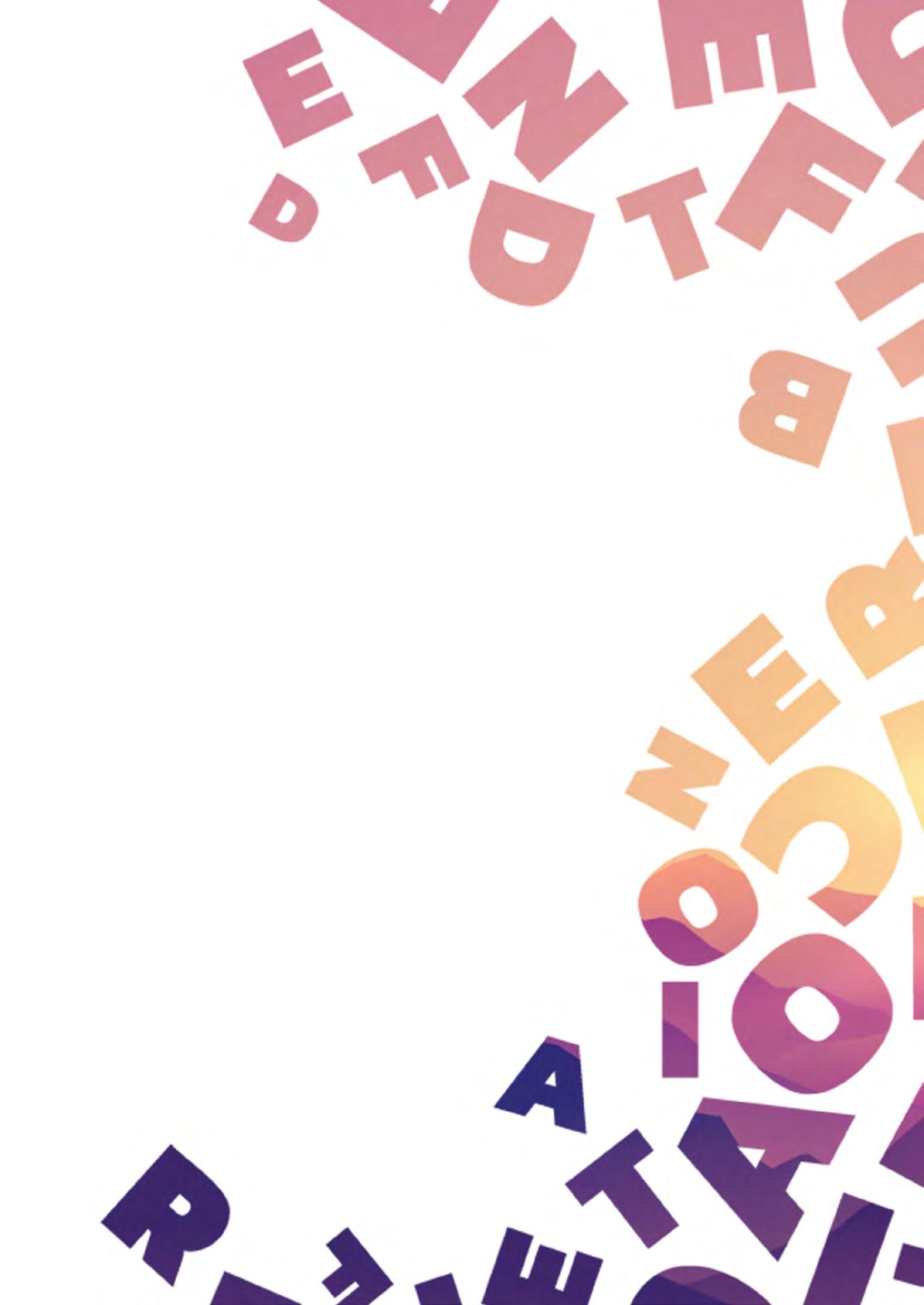








The Council of Asian Liberals and Democrats (CALD) came through in 2022, an interesting year with all the complexity of mixed challenges and remarkable feats.
For more than two years, the world experienced standing still, sheltering, and working from home as the pandemic rampaged across nations. Through all these, CALD remained resolute in our unwavering commitment to build a better future, a better democracy for our nations in Asia and the world.
As we are seeing the tail-end of the pandemic with more mobility for people across the globe, it is imperative for us to reflect upon the lessons learned from it. We need to reshape ourselves in the way we relate and connect with one another, and the way we treat and care for our planet. One thing has been made clear to us: we cannot remain indifferent to the suffering of others in the face of rising poverty and hunger, climate catastrophes, war and authoritarianism. We have to make our world a better
place for our children and our children’s children—our future.
In 2022, we continued growing our dream of a better world by creating re-imagined cities that are more responsive and efficient in achieving a better quality of life.
CALD propelled forward the three-year plan (2019-2021) of CALD Smart City Projects with the January event entitled “Toward Reimagining Smart City Plans and Strengthening Partnerships.” The webinar featured three projects that showcased building intelligent communities of tomorrow today: First, the Smart Kampung in Banyuwangi, Indonesia, a village-based, integrated public-service system that enables residents to complete administrative tasks in their village office and to connect, cooperate, and even compete with other villages. Second, the Employment Management Information System in Lumajang, Indonesia, which aims, among others, to help job seekers and businesses with the information needed to access and provide opportunities.
Third, the 2021 Smart City Taoyuan Project in Taiwan, promoting the city in the forefront of smart governance, smart industries, and smart city living.

In April, we had the CALD Smart Mobility Workshop in Tagaytay, Philippines, a hybrid event during which we gathered the best practices, trends, and current mobility issues in Asia. In September we had the follow-up Writeshop in Bangkok, Thailand, where we drafted and finalized the preparation for the baseline study for smart mobility in Asia.
From 27 June to 8 July, liberal democracy celebrated a milestone in Europe and Asia with the 75th Liberal International Congress in Sofia, Bulgaria, where we held also held our 45th CALD Executive Committee Meeting. Alongside this, CALD participated in the Germany Executive Mission in Berlin. There were other meetings and fora as well, including the 9th ALDE/Renew Europe Summit.
CALD capped the year with the November event of 14th CALD General Assembly and 46th CALD Executive Committee Meeting in Manila and Iloilo, Philippines, focusing on “Building a Democratic Coalition Against Disinformation.” It was also there that we formally launched the book The Great Asian Pushback, which itself is a milestone in fighting the lies, falsehoods, misinformation, and disinformation.
As I have said before, we save democracy by fighting disinformation by living democracy. And that is what CALD did in 2022 and will continue to do in years to come.

The events of 2022 do not inspire confidence to answer the question in the affirmative. Globally, the Russian invasion of Ukraine and the protracted war that results from it show how emboldened autocrats are to commit military aggression against democratic countries. As what some observers correctly put, this is not a war between Russia and Ukraine. It is Russia’s war against the West and its values.
In Asia, the repercussions of the Russian aggression were also felt in the Taiwan Strait. Parallelisms were drawn on how China, bolstered by Russia’s actions, could also launch an invasion of Taiwan, which it considers as a renegade province. The visit of then U.S. House of Representatives Speaker Nancy Pelosi to Taiwan triggered Beijing to launch large-scale military exercises, raising the possibility of a Fourth Taiwan Strait Crisis.
Elsewhere in the region, the actions of Russia and China are buoying up dictators and leaders with authoritarian legacy. In Cambodia, the arrest of human rights and democracy activist and lawyer Theary Seng for “conspiracy to commit treason” and “incitement to create gross chaos impacting public security” is indicative of

the worsening political and human-rights situation in the country ahead of the July 2023 parliamentary elections.
In Myanmar, the military junta’s continuing killings and imprisonment of anti-coup activists show that state terrorism has become the order of the day in a country reeling from a worsening civil war. In the Philippines, the overwhelming victory of the son of a dictator in the presidential elections indicates either the persistence of authoritarian nostalgia or the general population’s susceptibility to disinformation.
These events may be disheartening for us, Liberals and Democrats, but it is worth noting that while the odds may seem to be against us now, we remain to be committed and relentless in defending democracy.
For one, the Ukrainians are fighting back despite the inherent superiority of Russian military forces. The Taiwanese continue to assert their rightful place in the community of nations in the face of overwhelming Chinese pressure. Members of the Cambodian opposition are organizing for the upcoming elections even if such exercise would neither be free or fair. The Myanmar people are sacrificing life and limb to regain their rights and freedom. The Philippine Liberals are dusting themselves
off to prepare for the midterm elections. And not to be forgotten, the Malaysian opposition regained political power amidst attempts to hijack the results of the November 2022 elections.
Liberals and Democrats, however, must go beyond defending democracy from authoritarian and populist attacks. Now, more than ever, we must come together and reconstruct the liberal democratic world order in a way that responds to current and future challenges. This entails recognizing our mistakes and limitations and doing something about them.
We are aware, for example, that the liberal world order has made some people and countries feel that they are being left behind. We must address their concerns by making sure that our institutions and processes are inclusive, and that the benefits from the liberal order are equitably shared.
We are also aware that our enemies —populists and autocrats—are using unconventional, immoral, and illegal means to perpetuate themselves and their ilk in power. We must make sure that our strategies and tactics as Liberals and Democrats, while guided by the principles and values of liberal democracy, are responsive and effective against those used by authoritarians and populists.
Finally, we are aware that we have become complacent because of our success, and that we have failed to realize that the people’s faith in liberal democracy needs to be constantly renewed and sustained. Moving forward, we should ensure that liberal democracy is nurtured and protected by practicing what we preach and delivering on our promises.

These are just some ways we can protect our gains and make the people invested in democracy. We can do more, and we have to do more, for democracy to not only survive but thrive.
Last year, Liberals and Democrats faced seemingly insurmountable challenges, but our commitment to principles, values, institutions, and processes of liberal democracy remains unwavering.
This commitment, without a doubt, would ultimately lead us to a time when democracy would be robust enough to need neither saving nor defending.

FIVE YEARS have passed since I assumed the position of CALD Women’s Caucus Chair. Much has happened to our women in those few years, both good and bad. We witnessed our friends and allies being exiled, persecuted, taunted, and even jailed. We saw them struggle, we saw them fight, we saw them fall. But we also saw them resist, we saw them persist, and we saw them triumph.
We felt the rise of the collective power of women through the social movement #MeToo, the unwavering spirits of the youth as they protested in the streets, the undying hope for truth and justice of imprisoned women like Senator Leila de Lima, Theary Seng, and Aung San Suu Kyi. We also experienced the successes of women political leaders during the pandemic crisis and how they saved their countries.
Today, as a woman leader, I am inspired by the strength, resilience, and determination that our women possess. It is truly an exciting time to be a woman. The world is changing and with each passing day, we are becoming more empowered to shape our own destinies and claim our place in the world as equal partners and leaders. It is an undeniable fact that women are an integral part of democracy, co-actors in sustainable development, and are key to good governance. We, too, can help shape society and defend democracy.
In November 2022, I was present as CALD held its 14th General Assembly in Iloilo City, Philippines, where leaders and members of organizations from different regions gathered as one, to defend the truth, in the midst of an era where disinformation is rampant and deeply perpetuated by those in power. I was able to share the importance of combating disinformation together. Defending truth requires a global dialogue, and it should start with us.
Our journey to a full democracy and empowerment is long and it is far from over. Despite the progress that has been made, we will still face challenges and obstacles that will hold us back. Which is why we should help each other, support one another, and work together toward our goal. I know that together we can overcome any obstacle and achieve our goal of a just and equitable society.
Being with CALD Women’s Caucus all these years has been both an honor and a privilege. I am thankful and I am glad to share these years of championing women. As I end my term as Chair, I wish the next Women’s Chair all the hope, all the love, and all the best. I look forward to the coming years where Liberal Women continue to break down barriers and shatter the glass ceiling.

The year 2023 is an important one for Asia, especially among nations where elections will be taking place. I believe this will be a year of restoration. With the COVID-19 crisis behind us, tourism will drive the economies of the world. Exports will revert to levels they were at before. It is now time for us to return to the crisis of our generation: the global climate crisis, which we have consistently missed the mark on. Perhaps it is time to review our regional energy development plan. Small Modular Nuclear Reactors have the potential to reduce greenhouse gas emissions while keeping up with our growing energy needs. They provide an exciting avenue that could address our longstanding predicament.
This will be my final year as the chairperson of the Council of Asian Liberals and Democrats Youth. Two years of unavoidable circumstances have postponed our elections, but no more!
The past four years have been unforgettable for me. I want to take a moment to express my gratitude for the opportunity to serve in this role. Being a part of CALD Youth has taught me a lot. It has been an honor
to work with all of you and to lead this organization through its challenges and achievements. I’ve had the privilege of friendship with all of you and shared in your dream of democracy. Together, we have supported each other and overcame every trial we faced. Together, we have accomplished so much and I am proud of what we have achieved.

I am confident that the organization will continue to thrive and make an impact under the guidance of the incoming leadership. I want to already congratulate the new President of CALD Youth and extend a warm welcome to all new members.
I will always look back on my time as CALD Youth chairperson with fondness and appreciation. Whatever obstacles we face in the future, we will get through and win—for we are the future of our world.

27 January | via Zoom
To close the three-year CALD Smart City Project, CALD organized a webinar to present the project output of three local governments from Indonesia and Taiwan. The local governments also shared their smart-city plans as the world continues to face the global challenge of reimagining cities that are more resilient and efficient.
20—22 April | Tagaytay City, Philippines

To jumpstart the CALD Smart Mobility Project, CALD organized its first hybrid Smart Mobility Workshop in Tagaytay City, Philippines where participants discussed the definition, concepts, current developments, and issues of smart mobility and infrastructure in Asia.

27 June—8 July | Sofia, Bulgaria & Berlin, Germany
CALD, in cooperation with ALDE Party and Renew Europe, held its latest ALDECALD Summit on the sidelines of the 75th Liberal International Anniversary Congress in Sofia, Bulgaria. The 45th CALD Executive Committee Meeting was also one of Congress’s fringe events. Afterward, CALD held an executive mission to Germany to network with the FNF/FDP representatives, German officials, and think tanks and continue the exchange on issues facing both Europe and Asia.

21—24 September | Bangkok, Thailand

Held in September in Bangkok, Thailand, the CALD Smart Mobility Writeshop drafted and finalized the preparations for the Smart Mobility baseline study. It also identified the local government units from CALD member-parties that are interested to join the Smart Mobility Project.


10—14 November/Manila and Iloilo City, Philippines
Organized and sponsored by CALD, in cooperation with the Liberal Party of the Philippines and the Center for Liberalism and Democracy, with the support of FNF, this event gathered political leaders, journalists, teachers, and artists from all around Asia to discuss the threats of disinformation and offer solutions on how to defend the truth.


CALD began 2022 by celebrating the successful wrapping up of its three-year Smart City Project (2019-2021).
To mark the event, CALD held a webinar on 27 January with the theme “Toward Reimagining Smart City Plans and Strengthening Partnerships.”
With support from the Friedrich Naumann Foundation (FNF) for Freedom, the CALD Smart City Project had been carried out in cooperation with CALD member-parties Democratic Progressive Party (DPP) of Taiwan, the Indonesian Democratic Party of Struggle (PDIP), and Nation Awakening Party of Indonesia (PKB).



Highlighted at the webinar were the accomplishments of three local governments—Banyuwangi and Lumajang in Indonesia, and Taoyuan City in Taiwan—that had continued to push boundaries and implement solutions for their people even in the midst of the pandemic. As CALD Executive Director Lito Arlegue remarked at the event conducted via Zoom, local governments, being closest to the people, can be “hubs of innovation” and push for fast, effective, and sustainable solutions.”
“Government is best when it’s closest to the people…being with people immerses one with the real and pressing problems on the ground,” he said. “One gets a sense, firsthand, of what’s relevant and important.”
The webinar, which presented the project outputs of the three local governments, convened local government leaders, city government officials, and CALD members and partners, as well as students. The event also aimed to share the local governments’ respective smart-city plans as the world continued to face the challenge of reimagining cities in the aftermath f the pandemic—when the need to be resilient, efficient, and responsive becomes pertinent to achieve better-quality living.
Karen Yu, Director General of the Information Technology Department of the Taoyuan City Government, shared the city’s vision on inclusiveness, diversity, and sustainability. Some 24 km west of Taipei, Taoyuan as a hybrid city welcomes a diverse workforce and community. By offering the Taiwan citizen card to residents, workers, and business owners, users are able to access facilities and public services (transportation, shops, personal identification), and serves as an electronic payment card for everyday use.
Taoyuan’s goal is to increase accessibility and replicability of best practices of smart-city initiatives to further strengthen growth and development together with the international community. CALD worked together with Taoyuan to present a video featuring its smart-city plans.
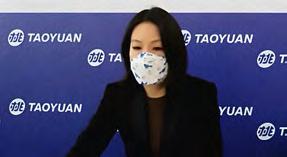

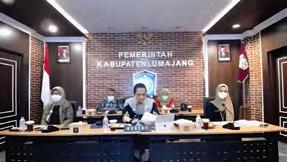

Progressive policies can produce results and empower communities despite the distance. This is how Regent Thoriq ul Haq addresses the issues of safety, traffic jam, education, health, infrastructure, environment management, disaster, and poverty in Lumajang in East Java province. Indeed, the local chief executive realized early that poverty, one of the priority issues there, can be addressed by improving the quality of education and health, increasing investment, and reducing the unemployment rate.
In cooperation with CALD, Lumajang worked on the Manpower Management Information System to help the regency build a database of jobseekers, employers, businesses, and geographical locations; improve labor distribution supervision; expand access to information; and aid officials in crafting appropriate policies based on data gathered. In this manner, the public can access information on jobs and training while the local government increases opportunities and the protection of workers and citizens.
Providing direct solutions to the concerns of villagers is crucial but not always easy to do. Yet the Banyuwangi Regency, which lies on the eastern tip of Java, was able to address more than 5,000 problems on MSMEs, education, licensing, infrastructure, and health, among others, according to Budi Santoso, head of the regency’s Communications, Informatics, and Encryption Department.
Through Banyuwangi’s Smart Kampung program, the technology addresses the issues of distance and time of public service delivery from the center of government to all villages. “The distance from the farthest village to Banyuwangi city is about 200 km, which is a travel time of approximately three hours,” Santoso noted.
CALD worked on a video with Banyuwangi to continue to promote Smart Kampung to all villages and encourage the people to utilize and maximize its potential.
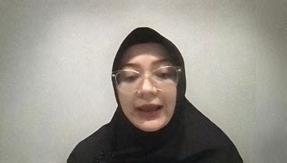

“CALD, as a regional alliance of free and democratic parties in Asia, has always been committed to providing members and partners with a development platform for smart and sustainable urban dialogue and cooperation”, said DPP spokesperson Peifen Hsieh.
DPP’s International Department, she added, remains committed to promoting more smart-city development cooperation among local governments under CALD member-parties, in line with CALD’s goal of building inclusive, empowering, and technology-oriented cities of the future.
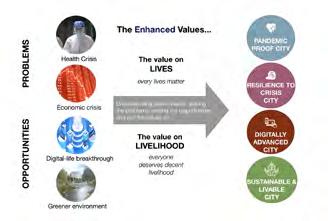

20—22 April | Tagaytay City, Philippines

Across the globe, cities are struggling to keep up with the surge and growing demands of urbanization, particularly in terms of addressing mobility issues. The issues revolve on how to provide the general public with safer, more diverse and better quality transport choices. After all, a thriving city is a city that moves.
 CALD SMART MOBILITY WORKSHOP
CALD SMART MOBILITY WORKSHOP
After concluding its Smart City Project that engaged local governments from Indonesia and Taiwan, CALD began a new journey, this time focusing on smart mobility and infrastructure development. Running from 2022 to 2024, the Smart Mobility Project aims to provide guidance in the smart-mobility plans and initiatives of particular local governments in Indonesia, Taiwan, the Philippines, and Thailand.
To jumpstart the project, CALD organized its first hybrid workshop in Tagaytay City, Philippines with the theme “Smart Mobility in Asia: Identifying Transformative Opportunities and Challenges.” It had three main sessions: Smart Mobility Concepts, Developments in Asia: Practical and Real-World Applications of Smart Mobility, and Developments in the Philippines.
The workshop brought together virtually and in-person representatives of CALD
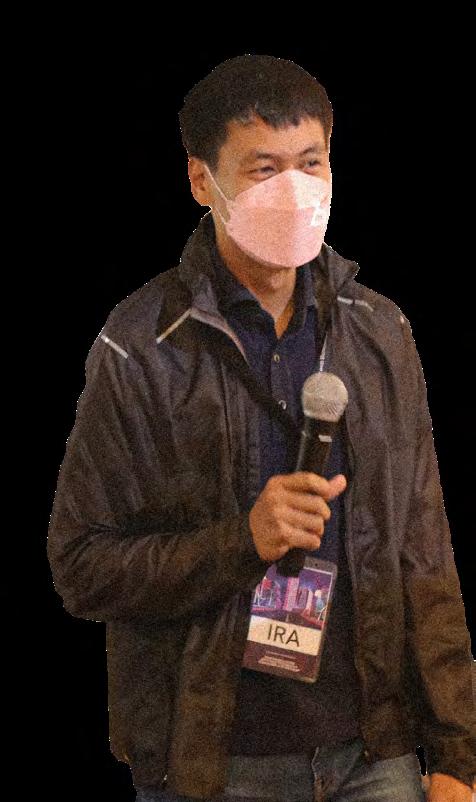

member-parties, as well as mobility experts from private institutions, the academe, and the government to discuss smart-mobility developments and issues in the region. Acting as facilitators were AltMobility PH’s Ira Cruz and Miguel Karlo Abadines.
Participants and speakers agreed that the goal of both smart cities and smart mobility is to foster the sustainability of cities and the improvement of the lives of citizens. While smart cities can be defined in many ways, smart mobility zeroes in on the freedom of movement enabled by data, human interactions, and technology to develop safe, convenient, and intelligent transport systems. Remarked Dr. Segundo Romero, Director of Innovation at the Base of the Pyramid in Southeast Asia (iBop Asia) Program: “The key is moving people, not vehicles. Efficient and effective public transport must be at the backbone of the transport system.”

For sure, every city is unique and problems vary from one country to another. For example, Ellie Kan of the International Division of Smart City Taiwan explained that in Taiwan, the push to go smart is due to traffic congestion, outdated urban planning, evolving consumer behavior, decreasing labor force, and rising environmental concerns. Dr. Yos Sunitiyoso, vice president for research, devel opment, and training at ITS Indonesia, meanwhile said that in his country, the main reasons why people don’t use public transport included long travel and waiting time, impracticality, cost, and inaccessibility.
But as Go Smart Taiwan Deputy Secretary General Anita Chen noted in the work shop’s Session I, smart mobility itself has four layers that are connected with each other: infrastructure, data, service, and policy. She also explained that the integration of all layers is reflected already in the innovations that people currently use—for instance, the all-pass ticket system in Taipei and the MeNGo Mobility-as-a-Service (MaaS) app in Kaohsiung City.
Kaohsiung’s MeNGoMaaS App integrates multi-modal transport, information and communication technology platform, and payment systems all in one device. Based on 2019 data, the city has seen public transport usage increase from 17,000 individuals to 36,000 a month, increased revenue of public transport operators from NTD 598,000 to NTD 741,000 (US$19,700 to US$24,000), and increased savings for users from NTD 741,000 to NTD 1.12 million (US$24,000 to US$37,000) since the app began to be used in 2016.
Contrast that with the Indonesian megacity Jakarta, where there are 88.2 million daily trips with people commuting two to four hours daily. Traffic congestions in the Indonesian capital have meant US$6 billion per year in productivity loss.
The good news is that the passage of government regulations and decree mandates continues to aid in building and developing transportation programs toward intermodal integration in Indonesia. The JakLingko is an example of public transport program, aided by local policies, that highlights integrated systems of payments and transportation modes in Jakarta, including TransJakarta, KRL Commuter line, MRT, LRT, Railink and local angkot or transportation. According to Dr. Yos, public-transport integration means having a connected design network, integrated policies, pricing structures, and real-time data capabilities, synchronized scheduling, and unified marketing.
Dr. Yos said that understanding user behavior in metropolitan Jakarta can help achieve its target of increasing public transport mode share from 25 percent in 2019 to 60 percent in 2029. He stressed that the process to study and evaluate the history and past experiences of commuters is crucial.

Studying all kinds of data, in fact, can only help in setting up smart-mobility systems and processes. Pointed out Dr. Erika Legara, Aboitiz Chair in Data Science from the Asian Institute of Management, during Session II: “You cannot manage, improve, and control what you do not measure.”
Earlier, Dr. Jin Young Park, Director at Korea Transport Institute, had also underlined that the full utilization of existing data and technology can help communities improve operations across cities. Legara, though, said that to generate the right data, one must ask the right questions first. Legara, who previously worked on a project with the Singaporean government on data visualization and model-simulation platform, also said that a data-driven mindset is important because implementing policies based on intuition alone could be expensive and catastrophic if they turn out wrong.

Move as One Coalition convenor Dr. Robert Siy Jr., for his part, went a step further and highlighted the need for a transformative mindset and approach in dealing with the challenges of mobility. Speaking in Session III, Siy said that people need to move to more progressive actions; this means a shift from private transport to public and active transport, which pertains to improvements in bicycle and pedestrian infrastructures.
In the Philippines, Siy said, there is a very minimal budget invested in road-based public transport that is very much needed by the people compared to road-based infrastructures. This shows a “history of neglect,” he said.

A shift to a more collaborative approach of working with like-minded individuals such as progressive public servants, legislators, and media practitioners, can be a catalyst for change, he continued. Data-sharing and policy analysis coupled by building partnerships can bring down the barriers of misunderstanding regarding the realities in mobility.

Mobility is a basic need and public transport is an essential service, Siy noted. Embracing progressive solutions can, indeed, open doors of opportunities toward new directions.

27 June—8 July | Sofia, Bulgaria and Berlin, Germany

Most people nowadays indulge in revenge travel. In mid-2022, in the midst of an ongoing pandemic and a raging war in Ukraine, CALD went to Europe not for pleasure, but for a marathon of revenge in-person meetings.

Before COVID-19 began forcing the world to shut down in early 2020, Alliance of Liberals and Democrats for Europe (ALDE)-CALD Summits had been held alternately between Europe and Asia every two years, since 2004. The summit’s 2020 edition, which was supposed to be hosted by the ALDE Party and Renew Europe on the sidelines of the Liberal International Congress in Sofia, Bulgaria, was, like most events that year and the next, cancelled due to COVID-19.

As 2022 wore on, however, it looked like the spread of the virus was finally beginning to be under significant control. CALD, in cooperation with ALDE Party and Renew Europe, thus set the ALDE-CALD on the sidelines of the 75th Liberal International Anniversary Congress in Sofia, Bulgaria. It also scheduled the 45th CALD Executive Committee Meeting as one of the Congress’s fringe events. To make the most of the long-delayed trip, CALD added to its itinerary a post-Congress executive mission to Germany to
network with representatives of FNF and the Free Democratic Party (FDP), German officials, and think tanks and continue the exchange on issues facing both Europe and Asia.
From 28 June to 3 July, the CALD delegation—made up of representatives of member-parties from Cambodia, Indonesia, Malaysia, the Philippines, Singapore, Taiwan, and Thailand—was in Sofia, Bulgaria for the LI Congress that had as theme “Reconstructing the Liberal Order.”

The global liberal gathering, unfortunately, had as a backdrop the devastating Russia-Ukraine war, complete with its attack on liberal and democratic values and implications on energy and food security. Fittingly, the LI Congress included a panel discussion on “Defense and Security in a New World Order,” where CALD Secretary General Francis Gerald ‘Blue’ Abaya served as speaker. The panel analyzed the latest developments that put global peace and security at risk. In his presentation, Abaya emphasized how defense and security in the Asia-Pacific are tied with the interests and policies of the United States and China. He also noted how the Taiwan Strait crisis and South China Sea disputes, like the war in Ukraine, could be threats to global security.
CALD Chairperson Francis ‘Kiko’ Pangilinan also participated in the Congress’s Council of Liberal Presidents (COLP) meeting, albeit virtually. In his intervention at the meeting, Pangilinan called for a reconstruction of a liberal world in a way that would respond to current and future challenges.
“While we, Asian Liberals and Democrats, are facing seemingly insurmountable challenges, our commitment to principles, values,
institutions and processes of liberal democracy remains,” he said. “Liberal International can be assured of having a reliable partner here in Asia in your efforts to reconstruct the liberal world order.”
While the LI Congress was going on, CALD took time on 30 June to have its 45th Executive Committee Meeting to discuss and sort all administrative matters concerning the Council, particularly the line-up of activities for the second half of the year.


On 2 July, the 9th ALDE-CALD Meeting also took place on the sidelines of the LI Congress, with populism as the focus of the discussions. Europe and Asia, after all, are both affected by the global populist trend as evidenced by the rise of political leaders such as Hungary’s Viktor Orbán and the Philippines’ Rodrigo Duterte. In the forthcoming European Parliament elections in 2024, populist forces threaten to further strengthen their hold amid growing distrust in politics and rising energy and food costs brought about by the Russia-Ukraine war. Similarly, in Asia, populist promises, combined with disinformation, marked governance, and recent electoral exercises would most likely continue in the years ahead.
“We should be able to live with populism to a certain extent,” said Rachada Dhnadirek, deputy government spokesperson of Thailand. “In order to win elections, voters want us to address
bread-and-butter issues. If we can’t win elections, we can’t promote liberalism.”
Rachada made this argument as she traced the evolution and continuity of populist policies from the Thaksin era up to the current government. She acknowledged, however, that populist policies are not sustainable in the long-run, which meant that the challenge for liberals was “how to be less populist and still win elections.”
The need to win elections can be best illustrated by the experience of Filipino Liberals, who had suffered their second straight electoral loss in the May 2022 polls. The Liberal Party had been in government from 2010 to 2016; the Aquino administration had ushered in an era of stable economic growth and multiple credit rating upgrades. But these were either not felt by, or not communicated well to, the people. Observed LP vice president for external affairs Lorenzo ‘Erin’ Tanada III: “Unless liberal leaders are able to make policies effective or felt on the ground, populist personalities with charisma will always appear.”
That the government should be felt by the people was also emphasized by ALDE Party Co-President Ilhan Khuckyuk in his intervention. Highlighting the rise of populist leaders and political parties in many countries in Europe and in the European Parliament, he said, “We have to deliver as European Union. What we promised, we have to deliver. If we don’t deliver… populist political parties (would) build their narrative on the weakness of the European Union.”
One common observation among the Meeting’s participants was that pervasive disinformation went hand in hand with the rise of populism. Renew Europe Vice President Iskra Mihaylova noted that a European Parliament-commissioned study on disinformation showed links of information operations to Russia and China, as well as to EU member-states such as Hungary. To address disinformation, Mihaylova recommended listening more to the practical solutions proposed by EU citizens through the Council of Europe, and also for the media to report on the positive news regarding European institutions.
The Meeting also featured an open forum that was moderated by FNF Southeast and East Asia Office Regional Director Moritz Kleine-Brockhoff.




At the forum, Ukrainian politician Kira Rudyk observed that one way to address populism would be to interweave it with the reform agenda. Cambodian opposition leader Sam Rainsy meantime asked whether populism can inevitably lead to dictatorship. The bulk of the discussion, however, was on the extent liberal political leaders could avoid populism. One view held that political leaders should be populist to a certain extent to win elections, especially in the context of the pandemic and wide income disparity. The other perspective argued that being a little populist is a slippery slope and that liberals should instead emphasize that there is no contradiction between liberal values and bread-and-butter issues.

The various ideas and questions raised at the LI Congress and ALDE-CALD Meeting were still rattling inside the heads of the CALD delegates as they made their way next to Germany on 3 July, for a four-day executive mission there. They had two main objectives: One was to discuss ways on how to support and strengthen liberal democracy in Europe and Asia, particularly in light of the rise of populism, authoritarianism and illiberalism. The other was to tackle possible areas of cooperation between CALD and FDP, FNF, and other relevant organizations or institutions on various fields such as transnational advocacy, political education and research, institution-building, and political communication.
The delegation met with representatives of the German Federal Foreign Office, Federal Ministry for Education and Research, and Federal Parliament. Konrad Lax, deputy head of the department ASEAN-member states/ARF/ APEC of the Federal Foreign Office, discussed Germany’s China policy, as well as the country’s stance on specific human rights and rule of law issues in Asia. Mario Brandenburg and Johanna Borsch-Supan of the Education and Research Ministry, informed the delegation about Germany’s programs on historical and political education. Frank Müller-Rosentritt of the ASEAN Parliamentary Group in the Bundestag tackled how Western countries, including Germany, could play a more prominent role in Asia in order to counter China’s influence.
The CALD delegation also had briefings on recent developments on German politics and FNF’s strategic goals and direction, courtesy of FNF’s Board Chairman Karl Heinz-Paque, Chief


Executive Officer Annett Witte, and Asia Desk head Charles du Vinage. In addition, the delegation members had discussions with Felix Heiduk of the German Institute for International and Security Affairs (SWP), which advises the German government and parliament on questions of foreign and security policy; and Markus Löning, managing director of Löning: Human Rights and Responsible Business, which helps companies understand and meet their responsibilities with respect to human rights.
“CALD’s participation to the LI Congress and Germany Executive Mission provided an opportunity for us to inform our counterparts in Europe and elsewhere about the most pressing political issues and concerns that we have in the Southeast and East Asian region,” said CALD Secretary General Abaya. “At the same time, our participation also allowed us to understand their perspectives and learn from their experiences.”
“Without a doubt,” he said, “our participation gave us valuable information and insights that we can use as we try to reconstruct the liberal order in our part of the world.”



21—24 September | Bangkok, Thailand
To continue the deeper appreciation of the situation of each country when it comes to developing smart mobility, CALD in its Smart Mobility Workshop held in April had come up with a plan for a baseline study that would gather the best practices in Asia, as well as identify emerging mobility trends and issues in the region. It produced an outline for the study as well, and by late September, CALD was ready to get it going.
 CALD SMART MOBILITY WRITESHOP
CALD SMART MOBILITY WRITESHOP
Adopting as theme “Smart Mobility In Asia: Emerging Trends, Opportunities, and Challenges,” CALD organized the Smart Mobility Writeshop in Bangkok, with the aim of drafting and finalizing preparations for the study. Participants included transportation experts as well as representatives of CALD member-parties and local governments who discussed smart-mobility updates in the region and shared best practices in terms of local government plans and actions in four target countries: Thailand, the Philippines, Indonesia, and Taiwan. Later, the participants were briefed by a Metropolitan Rapid Transit representative on the concept of the Mangkorn station and how
the MRT operates in historic areas and reduces traffic, as well as traveled from Mangkorn to Isara Station so they could see firsthand how the MRT facilitates the flow of people.
During the two-day writeshop, local government officials and the designated writers presented the general transportation situation in key urban areas in the four countries, provided an overview of the national and local policies that promote smart-mobility solutions, and shared the challenges in implementing policies and smart-mobility interventions.


For instance, Chala Anusuriya, assistant to the deputy leader of the Democrat Party, said that Thailand has a 20-year national strategy called “Thailand 4.0,” which aims to transform the country into a high-income nation and improve the quality of life in urban centers. Smart mobility is emphasized in this plan together with smart governance, smart living, smart environment, among others. But the success of the implementation, Chala noted, depends on the leadership and political will of the head of the government and head of the planning agency.

Leadership, indeed, drives mobility ideas to fruition. In the case in Trenggalek City, Indonesia. Mayor Mochamad Nur Arifin explained that his motivation to create a smart city is based on the principles of Soekarno, the first President of Indonesia, who emphasized public welfare. The mayor said that while he oversees the implementation process, he values and follows a bottom-up approach to engage and empower communities and provide affordable and accessible public transport. The expansion of bike lanes, smart benches, and multiple wifi zones are some of the projects he has already implemented in Trenggalek to help it transform into a smart, green, and climate-neutral city.
AltMobility PH Director Ira Cruz, for his part, said that while Indonesia and Thailand have shown a vision in terms of smart-mobility plans and are enjoying the benefits of good governance and effective leadership, the same is hard to imagine for the Philippines. The sad reality in Metro Manila alone, he said, is that 80 percent of road space are occupied by private vehicles even as 88 percent of the metropolis’s residents do not even own private vehicles. Cruz added that while there are policies intended to address the challenges of transportation and congestion in the city, these are suggestive rather than prescriptive. Still, he said that the continuing discussion of stakeholders, as well as the active participation of civil society and progressive ideas of local governments, can help change mindsets in mobility development.
Over in Taiwan, the push for innovative urban development and efficient urban ecosystems has been happening for years. Yet it still suffers various mobility challenges such as unnecessary traffic lights and traffic mismanagement, said Ellie Kan, Sales Manager of the International Division of the Institute for Information Industry, Smart City Taiwan.
Kan brought up three examples to show how even in a dynamic and forward-thinking country like Taiwan, mobility systems can be uneven. Taipei, for example, operates an MRT that is very popular and accessible to most residents. It also has other high-quality public transportation options like buses and shareable bikes and scooters. Kaohsiung meanwhile is “blessed with as many transit resources, [and] has continued to make leaps and bounds in recent years with regard to its smart mobility options,” she said. The Kaohsiung City Government has also been actively promoting electric scooters and vehicles (EV), she continued, and starting July 2022, it would be implementing a law that requires every new building to provide a space for EV-charging stations.
CALD’s smart-mobility baseline study is envisioned to become a reference guide for local governments and smart-mobility advocates. Pointed out Thai MP and Democrat Party Foreign Affairs Committee Chairman Kiat Sittheeamorn during the welcome dinner for the writeshop participants: “It must be said that the principles and goals of a smart city in general, and of smart mobility in particular, are very much in line with the values of CALD as a liberal and democratic network of political parties. As liberals and democrats, we are the most receptive to change brought about by technological developments.”
“We are doing this because we want a better quality of life for our people,” he also said. “After all, the people should be front and centre in all



In East and Southeast Asia, recent electoral exercises in the Philippines, Singapore, Hong Kong, and Taiwan had been mired in misleading information. Other countries in the region, such as Malaysia, Thailand, Cambodia, and Indonesia, were being predicted as likely to suffer the same fate as they prepared for general elections in 20222024. In countries like Cambodia, Philippines, Singapore, and Myanmar, disinformation has also been weaponized to target political opponents or dampen political support for the opposition.

Disinformation is one of the biggest challenges to democracies today. It is wreaking havoc not only in Asia, but also in other parts of the world. It is a global phenomenon that affects all countries with varying levels of democratic and economic development. And while disinformation is not new, the speed, reach and efficiency of the Internet is now making it easier to spread false information.

For its 14th General Assembly, CALD, in cooperation with the Liberal Party of the Philippines and the Center for Liberalism and Democracy (CLD), with support from FNF, chose as theme “Building a Democratic Coalition Against Disinformation.” Held in November, the series of events aimed to bring together political and party leaders from across Asia with members of the academe, media, civil society and other stakeholders in the Philippines to discuss ways for democratic forces to counter disinformation. The launch of the CALD publication The Great Asian Pushback: Interviews with Change-Makers was also scheduled on the first day of the GA.
the disinformation ecosystem in the context of elections, the rise of populism, and the corresponding decline of democracy. Session 3, meanwhile, would look at the role of the arts in addressing disinformation.
The multi-stakeholder conference was on Day Two, with participants discussing the Philippine experience on building and sustaining democratic coalitions to combat disinformation in relation to that of other countries in East and Southeast Asia. Starting with a session envisioned to reflect on the effects of disinformation on the recent Philippine elections, Day Two also included two Conversations, one looking at the experiences of Cambodia, the Philippines, and Thailand in building and sustaining counter-disinformation initiatives, and the other bringing together representatives from the academe, media, civil society, and political parties to identify key lessons learned from previous or ongoing counter-disinformation efforts.
But first, CALD attended to internal matters, holding its 46th Executive Meeting at Sheraton Manila Hotel on 11 November. The GA’s main events began the next day in Iloilo, a central Philippine city, with the opening session devoted to preparing participants for the forthcoming plenary sessions and conference. For Day One of the General Assembly alone, three sessions had been scheduled, each with a specific focus. Session 1, for instance, was on battling disinformation and historical distortion through education. Session 2 was to analyze

The talks and discussions during the two-day GA resulted in several important takeaways for participants and speakers alike. Liberal International Vice President Phil Bennion, for instance, suggested that pro-truth political leaders counter disinformation “consistently and more ag


“Don’t wait until the campaign,” he said during the opening session on Day One. “Present a positive vision. Counter everything with the same tenacity during campaigns between elections…Don’t let false statements pass.”
“We have to dig deep and do it consistently,” the former Member of the European Parliament also said. “Then truth can win over disinformation.”
Philippine Senator Risa Hontiveros-Baraquel, for her part, said in her keynote address on Day Two that making democracy real to people is the challenge democracy advocates must face to successfully defend it against disinformation.

“We have a monumental challenge ahead of us: the challenge of altering the political equilibrium, which in the last six years, has been stacked against us,” Hontiveros-Baraquel said. “We should coalesce with and support each other in making democracy real, not just politically, but economically and socio-culturally as well…We now have the prime opportunity to finally restore a democracy that is truly felt by all.”

The sitting opposition legislator also encouraged conference participants to organize similar gatherings that include people with different views.

“Crucially, we have to admit that for far too long we have been each other’s sounding board that perhaps sometimes we couldn’t recognize our own prejudices, our own blind spots,” she said. “If we were to have any chance at fighting disinformation, if we were to strengthen our love and belief in democracy, we must ensure that our actions and conversations in conferences like this, in spaces like this… do not stop among ourselves.”

CALD Chairperson Francis ‘Kiko’ Pangilinan had also noted a day earlier that even electoral setbacks caused mainly by disinformation need not spell the end for democrats. He pointed out that the “social, political, and cultural upheaval that took place in the campaign for the May 2022 national elections…(which) saw an unprecedented outpouring of support, creativity, courage, and bravery on the part of the Filipino people who came out in the hundreds of thousands to support our…Pink Revolution” was a huge indication that disinformation can be defeated.
Pangilinan said that the people who had been inspired by the idea of changing for the better, leading them to mobilize in the elections, can be tapped to organize a broader,


more structured, more methodical, multi-stakeholder coalition to address disinformation. He added, “As a farmer, I believe what we did in the last campaign was sowing seeds of change that in time shall see a bountiful harvest.”

By the end of the General Assembly, delegates from Thailand, Malaysia, Singapore, Mongolia, Indonesia, Myanmar, Cambodia, and the Philippines had adopted a declaration agreeing to “take appropriate action to reclaim lost or damaged democratic spaces.”
They also resolved to “adopt truth-telling and protection as an advocacy” and “combat disinformation” concerns in digital infrastructure, education, culture and arts, and democratic institutions and processes. The delegates vowed to reconvene to report on concrete progress in

CALD has welcomed back the Candlelight Party (CLP) of Cambodia as one of its members. Currently, Cambodia’s main opposition party, CLP’s membership application was unanimously approved by the CALD leadership during the Council’s 45th Executive Committee Meeting held on 30 June in Sofia, Bulgaria.


CLP was previously a member of CALD, but its name and membership through the years evolved into the Sam Rainsy Party, and then into the National Rescue Party of Cambodia. Based on the official results of Cambodia’s 2022 Commune Elections, CLP had a respectable showing at the latest polls that were held on 5 June, winning four commune chief positions and 2,198 council member slots.

The CLP, headed by Teav Vannol, strives to oppose and eliminate all social violence and all kinds of corruption to ensure peace in Cambodia. It states that it exists to “protect and promote human rights as stated by the United Nations and implement liberal democracy.”
The party’s operations in Cambodia have faced numer ous challenges due to the current repressive government. Among other things, the Hun Sen government has threatened to dissolve the opposition, weaponized the law against opposition leaders and civil-society activists, abused government institutions, and engaged in the systematic violation of fundamental human rights. But CLP Treasurer Mardi Seng, who was the party’s representative to the CALD Executive Committee, has said, “The seed of democracy has been planted and it has taken roots in more than 1,500 local communities. This rebirth or re-establishment of democracy will grow strong and will bear fruits if we liberals support and assist in watering it, caring for it, and tendering to it.”
In announcing CALD’s approval of CLP’s membership application, CALD Secretary General Francis Abaya expressed gratitude to the Cambodian party for joining CALD and for upholding the liberal and democratic principles amidst the mounting challenges in its home country. Said Abaya: “We believe that the people of Cambodia will see through the darkness and allow the CLP to guide them and rise above tyranny and inequality.”
CALD itself will always be ready to support its newest full member, the Candlelight Party, to achieve integrity, truth, and justice in Cambodia.



Address delivered via video link on 1 July at the 75th Anniversary Congress of Liberal International in Sofia, Bulgaria
I would like to begin by thanking Liberal International for inviting me to this important gathering of liberals from around the world. I also want to take this opportunity to thank our liberal partners for your continued support for the Democratic Progressive Party and Taiwan.
Last year we lost a dear partner and friend, ALDE Party President Hans Van Baalen. To me and to the people of Taiwan, Hans was not just a devoted ally and a staunch advocate of liberal values. He was also a trusted friend as we fought side by side to safeguard democracy and its ideals. A towering figure in the liberal movement, Hans left a legacy of a stronger economic and diplomatic partnership between Taiwan and the European Union. To carry on Mr. Van Baalen’s lifelong work, our representative office in Brussels and the Taiwan Foundation for Democracy, in partnership with the European Liberal Forum (ELF), ALDE Party, and the European liberal youth, have together launched the Hans Van Baalen Scholarship. With this scholarship, we hope to continue building relationships between Taiwan and the EU, and by doing so, to help the spirit of Hans Van Baalen live on, in all of us.
As the memorandum of this year’s congress theme states, the liberal, rules-based world order is facing perhaps its greatest challenge since the establishment of LI 75 years ago. Not only do we have to deal with the global human and economic impact of the COVID-19 pandemic, but we must also combat authoritarian regimes’ attempts to infiltrate our democratic institutions and erode human rights and civic space. Russia’s invasion of Ukraine shows that authoritarian regimes will use any method to accomplish their expansionist goals. This all comes on top of the existing challenges of climate change, as well as food and supply chain security.
It is for these reasons that I agree that there is a need—as stated in this year’s theme—to “reconstruct a liberal world order.’’ This is also why this physical gathering of the 63rd LI Congress in Sofia, Bulgaria, is so pressing and important. With this congress, liberals from around the world can discuss and form strategies in person on how we can face these challenges together. I know the representative from my party and from the newly established Asia Pacific-Chapter of the International Network of Liberal Women are also present at this congress. I encourage you all to meet with them to exchange experiences and discuss possible opportunities for collaboration.
For decades, the DPP has been on the frontlines of Taiwan’s democratization, defending democracy against authoritarianism. Liberal democracy is an integral part of our identity. In recent years, we have been confronted by increasingly aggressive threats from China, which is seeking to corrode what we have been working so hard for; that is, our democratic way of life. Therefore, the Taiwanese have been working even more diligently to address these challenges. From our civil society to our government officials, Taiwanese are not shying away from authoritarian intrusion. Instead, we are meeting these challenges head-on, and fighting against domestic and external forces seeking to undermine our democracy.
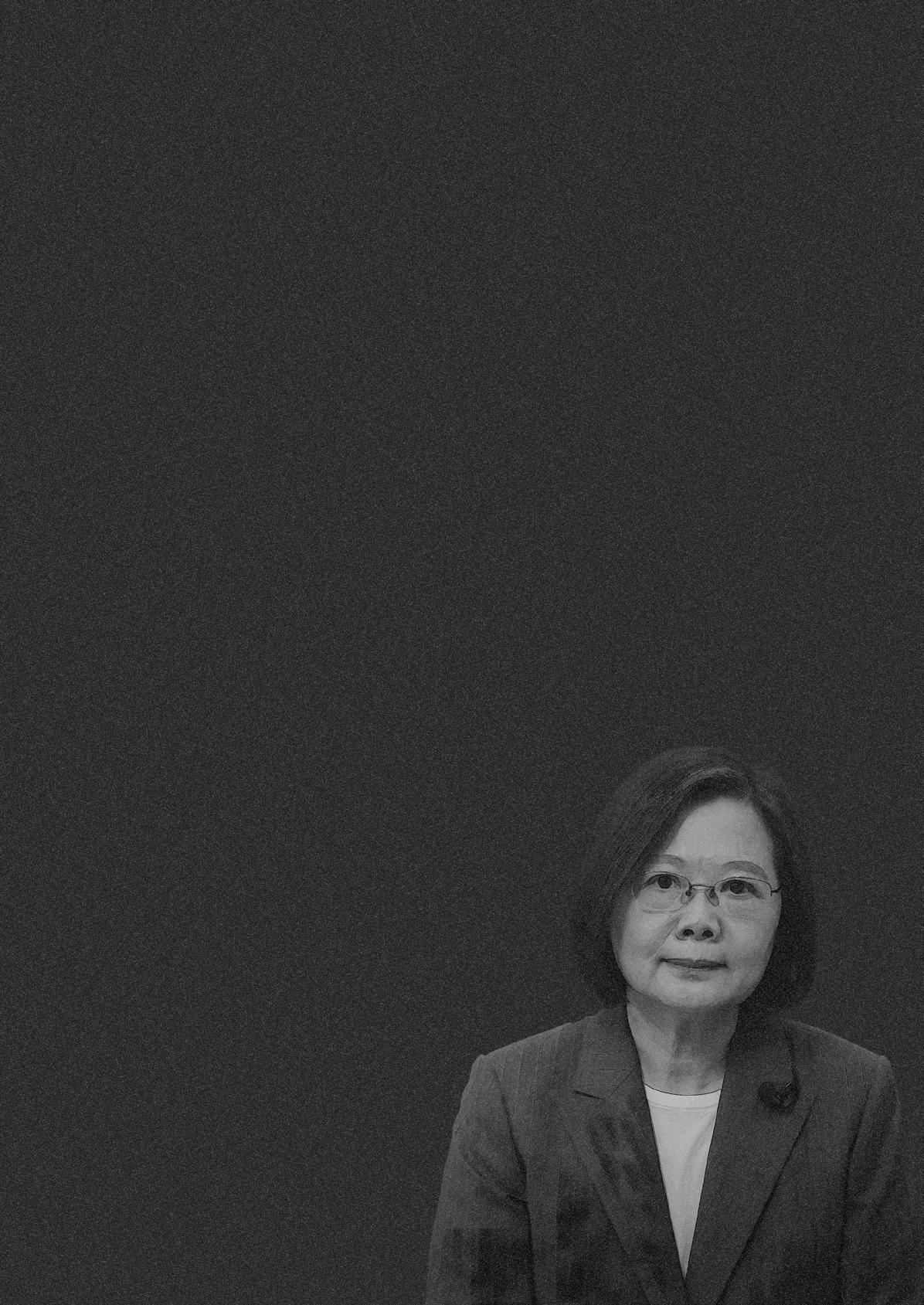

We are willing and eager to share our experiences in countering authoritarian influence with you all. Just as during the outset of the pandemic Taiwan donated masks and medical equipment to
our friends from around the world, we also stand ready to assist and strengthen our collaboration with the international community, working together to safeguard the liberal democratic world order.
I also believe that as liberals, we can, and need to, do more. As we watch the atrocities committed against Ukraine by Russia, Taiwan is proud to have played a part in the effort to assist the Ukrainians in their struggle to defend their country. But our effort must not stop here. We must educate ourselves on the authoritarian playbook. And we must strengthen our partnerships and defend one another. What authoritarian regimes do best is divide and conquer. Only when we work together and support one another can we succeed in combating the expansionist goals of authoritarian regimes.
Three-quarters of a century after Liberal International was founded, we find ourselves facing similar challenges as liberals and democrats. And, as we move toward the post-pandemic era, these challenges will only become more profound. But we have also come a long way as liberals. And we have a shared understanding of how democracy doesn’t come easy. I am confident that by standing united in our values and beliefs, we will always achieve what we set out to accomplish.
“Only when we work together and support one another can we succeed in combating the expansionist goals of authoritarian regimes.”
In more ways than one, Asia and the Pacific remains to be the fastest growing region in the world. According to the Asian Development Bank (ADB):
• By 2030, more than 55 percent of the population of Asia will be urban;
• Another 1.1 billion people will live in the region’s cities; and
• In many places, cities will merge together to create urban settlements on a scale never seen before—mega-regions, urban corridors, and city-regions will be the new urban configuration.
Given these realities, we should think ahead and plan accordingly so that we can integrate these issues and trends into our national development plans. As the ADB noted, “The prosperity of nations is intimately linked to the prosperity of their cities. No country has ever achieved sustained economic growth or rapid social development without urbanizing.”

A developed city is also a city that moves. It is for this reason that we are focusing on smart mobility in the next two days so that we can share experiences and best practices on how to integrate various elements of technology and mobility in the city’s transportation infrastructure. Our goal
 Kiat Sittheeamorn Thai Parliament Member Democrat Party Foreign Affairs Committee Chairperson
Kiat Sittheeamorn Thai Parliament Member Democrat Party Foreign Affairs Committee Chairperson
is to contribute to the publication of the CALD Smart Mobility Baseline Study, which, we hope, can be useful to our member-parties, especially those with a presence in local governments.
It must be said that the principles and goals of a smart city in general, and of smart mobility in particular, are very much in line with the values of CALD as a liberal and democratic network of political parties. As liberals and democrats, we are the most receptive to change brought about by technological developments. We are also strongly supportive of fundamental human rights, including freedom of movement and the right to travel.


For this reason, in the 2019 elections, part of the Democrat Party of Thailand’s platform of governance was a smart-bus project that hopes to provide Bangkok commuters with 5,000 electric buses in seven years. Another policy was to promote “smart taxis” by legalizing drivers who use personal cars to provide services via ride-hailing mobile apps. The Party also proposed to turn some areas in the city into walking streets for certain periods.
These are just some of the policies that we proposed as a political party. At the end of the day, we believe that every person deserves a safe, convenient, and commuter-centric transportation system. This should not be a privilege; it should be a human right.
Let me end with a reminder on why we are here discussing issues such as smart city or smart mobility. We are doing this because we want a better quality of life for our people. The people, after all, should be front and center in all our efforts to transform our urban areas into cities of the future.
“As liberals and democrats, we are the most receptive to change brought about by technological developments.”


Opening Remarks at Day One (12 November) of the 14th CALD
For this General Assembly, CALD has chosen the theme, “Building a Democratic Coalition Against Disinformation,” which, I must say, could not be more relevant for the Philippines. The Philippines had been described as “patient zero” in the global war against disinformation way back in 2018. Tragically, the results of our recent elections show that we have not yet recovered from the onslaught of trolls, influencers, and other peddlers of lies and deception in our digital landscape.
While the Philippines is one of the most affected countries in this disinformation epidemic, we also recognize that the problem is a global one. Disinformation has significant implications for the future of democracy, the observance of human rights, and the rule of law. The scale, scope, and reach of the global infodemic can be gleaned from the fact that in a 2021 global survey done by Oliver Wyman Forum, more than 80 percent of over 125,000 respondents said that disinformation is a problem, and almost a third said that they had been victims of fake news.
A recent report by the UN Office of the High Commissioner for Human Rights observed: “Disinformation comes in different forms. And this includes targeted operations by states, state officials, conspiracy-fed theories about health policies and vaccines, smear campaigns to undermine specific groups and persons, and many others.” According to the report, a key challenge of the digital age in navigating the modern media landscape is to ensure that technology advances rather than undermines human rights, international peace, and security. In a high-level panel discussion held at the UN Human Rights Council in New York City earlier this year, participants had also stressed that the spread of disinformation can have a negative impact on societies—undermining a broad range of human rights. They noted that when disinformation threatens human rights, states have a duty to take appropriate steps to address these harmful impacts.
Franklin DrilonThis susceptibility to disinformation can have significant impact on politics as well. Please allow me to cite some recent political developments that show the pervasiveness and repercussions of disinformation:
• In the run-up to the recently concluded U.S. midterm elections, an investigation by Global Witness and the Cybersecurity for Democracy (C4D) showed that Facebook and TikTok largely failed to detect and remove election disinformation. YouTube apparently did better, although this was in glaring contrast to the platform’s record in Brazil, where problematic election ads were approved.
• In the ongoing war between Russia and Ukraine, Kremlin pushed false narratives such as the Ukrainian President committing suicide, Ukrainian ‘Nazis’ being the aggressors and committing war crimes, and Western sanctions not making a huge impact on Russia. All these are being used to demoralize Ukrainian troops, alienate its allies, and bolster Russian citizens’ support for the occupation.
• In the upcoming nine-in-one local elections in Taiwan this 26 November, an uptick in Chinese-perpetuated disinformation is being observed, as expected. It is said that Taiwan’s local elections have gradually become China’s testing ground for techniques to disrupt the democratic process through Internet disinformation.
These are just some recent examples of how disinformation can shape political processes and outcomes. It must be said, however, that disinformation not only affects politics but the society at large. Because of false information, the shared norms, values, and understandings that are necessary for the effective functioning of every society have been put into question, even discarded. The societal institutions that used to safeguard moral standards and professional integrity, such as established religions and traditional media, have now become subjects of distrust and hate. In a world of digital disinformation, everyone has become vulnerable—to being a target and unwitting purveyor of disinformation/misinformation, to data hacking and harvesting, to cyber-attacks and cyber-bullying, and even surveillance and censorship. Given the wide-ranging scope of the problem, the possible solutions
should also mobilize all stakeholders—the international community, government institutions, political parties, civil-society organizations, the media, tech and social-media companies, and educational institutions, among others.
It is in this light that we are all gathered here in Iloilo for the next two days. We recognize that democratic forces from all sectors must come together to learn from each other and formulate concrete and effective solutions to the issue of disinformation. If the autocrats and populists can unite and support each other, we too can build and sustain coalitions that defend democracy and our fundamental freedoms.

The call of our times is clear. We are not only fighting against disinformation. We are fighting to preserve our democratic way of life—our freedoms, our rights, and our dignity as human beings.
My wish is that this democratic gathering in Iloilo can provide us with the necessary knowledge, skills, and strategies to win this fight for democracy.

“Disinformation has significant implications for the future of democracy, the observance of human rights, and the rule of law.”


In this age of the Internet, what you type on your computer or smartphone can instantly travel around the world, reaching tens of millions of people for their information or disinformation. The Internet has amplified the power of freedom of expression a million-fold, which is good. The Internet has also amplified a million-fold the power to libel, disinform, and mislead others, which is bad. We now realize that along with this amplified power to instantly broadcast worldwide our ideas, there must also be an amplified responsibility not to spread disinformation that libels or misleads others, or incites hatred. Without this amplified responsibility, the conversation within a community, within a nation, and among the peoples of the world will become toxic, dividing and tearing apart communities, classes, and nations.
This power to divide and tear apart societies has become an effective tool for moneyed people and foreign governments to influence the electorate in democracies for their own purposes. It can even lead to political violence. After the recent brutal hammer attack on Paul Pelosi, the husband of U.S. House Speaker Nancy Pelosi, analysts are considering: Was that attack on Paul Pelosi a continuation of the violent attack on the U.S. Capitol on 6 January 2021 by-election deniers who organized their attack on online platforms?
It cannot be denied that toxic disinformation on the Internet can incite violence and other unlawful acts. Just last week, the New York Times reported that Russia had restarted its trolls and bots for the midterm U.S. elections, with the aim of eroding American support for Ukraine in the Russia-Ukraine war.
There are broadly four kinds of toxic disinformation circulating on the Internet. First, are the libelous comments intended to destroy the reputation of specific persons, especially those in the political opposition. Second are the disinformation entirely or partly false but not libelous, intended to mislead people into acting against their own interest. In the Philippines, this includes hate speech directed at a group or community of persons. Third is disinformation that, although neither libelous nor false, is manipulated or slanted to influence the thinking of people in a way
contrary to their interests. And fourth are the fraudulent scams, or those intended to hoodwink the recipients of solicitations to part with their money.
The first kind of toxic disinformation—libelous comments—is punishable by law after the comments are made public or after the utterance is made. Libelous comments are punishable either by civil penalties like in the United States, or by civil or criminal penalties, or both like in the Philippines. The second type kind of toxic disinformation, those not libelous, but partly or entirely false, is not punishable in the Philippines. And it’s part of freedom of expression unless a case of inciting to sedition or inciting to terrorism can be made— criminal acts, which are quite difficult to substantiate. Included in the second kind of toxic disinformation is hate speech, which in the Philippines is not libelous if no specific person is identified. The third kind of toxic disinformation—those that are not false, but merely slanted—is also part of freedom of expression. The fourth kind of toxic disinformation is of course a criminal act, constituting estafa, because its examples inveigle people to part with their money.
The first kind of toxic disinformation can be curtailed to the barest minimum by legislation. The second and third kinds of toxic disinformation can be countered by fact-checking and by educational campaigns, but are not the proper subject of punitive legislation because of freedom of expression. However, the solution to curb the first kind of toxic disinformation will address greatly the second, third, and fourth kinds of toxic disinformation without infringing on freedom of expression. Freedom of expression is freedom without which all other freedoms cannot exist. Freedom of expression is the bedrock of a free society. There is, however, no freedom of expression to libel others. Libelous comments, if not redressed legally, could lead the libeled person either to resort to violence to defend his reputation, or to dish out his own counter-libelous comments, adding fire to the already toxic conversation. Today libelous comments pollute our online platforms together with disinformation intended to influence people to act against their own interests.
All these four kinds of toxic disinformation are always posted by fake or fictitious users on online platforms. They are the favorite tools of political and social manipulators using fake or fictitious identities to besmirch their adversaries and sow confusion in the public mind. The spread of this toxic disinformation is possible because online platforms allow their users to post comments using fake or fictitious names. A person hiding behind a fake or fictitious name can say anything libelous he wants and disseminate any disinformation he wants. He feels no responsibility to speak the truth. He has no fear of being penalized for ascribing falsehood against
anyone, or of being fact-checked or ridiculed for spreading disinformation. The use of fake or fictitious names is a perfect tool to libel anyone or to spread disinformation without being held to account. More importantly, it has become the perfect tool to destroy political opponents, especially during elections.
Online platforms willingly allow users to use fake or fictitious names and enable anyone to open multiple accounts under different names because this makes it seem as if there are more users of the platform, which generates higher Internet traffic. All of which translates into higher viewership, and therefore higher advertisement rates. It is all about money, all about income. The online platforms have a financial incentive not to require their users to reveal their real identities. In short, in choosing between maximizing profits from speech that incites social discord and violence, or minimizing profits by moderating speech that incites social discord and violence, online platforms choose to maximize profits.
We find names such as “Felly Penis Chimp Gago,” which is obviously fake. Felly Penis Chimp Gago is probably non-Filipino because he denigrates the name Philippines by using the name “Felly Penis” and insults Filipinos as crazy apes by using the name “Chimp Gago.” Felly Penis Chimp Gago could be Chinese because he or she posts comments supporting China’s claim to the West Philippine Sea and belittling the arbitral award in favor of the Philippines. Incredibly, Philippine online newspapers allow this user to post comments on their platforms.
Felly Penis Chimp Gago has supporters with names like Junior Tulo, Boy Bukol, Kolokoy Bukoy, and similar outlandish monickers. Nobody knows who these people are—not even the online platforms that have allowed them to post comments.
These commentators viciously attack the political opposition and obsequiously praise the pro-China policies of former President Rodrigo Duterte and
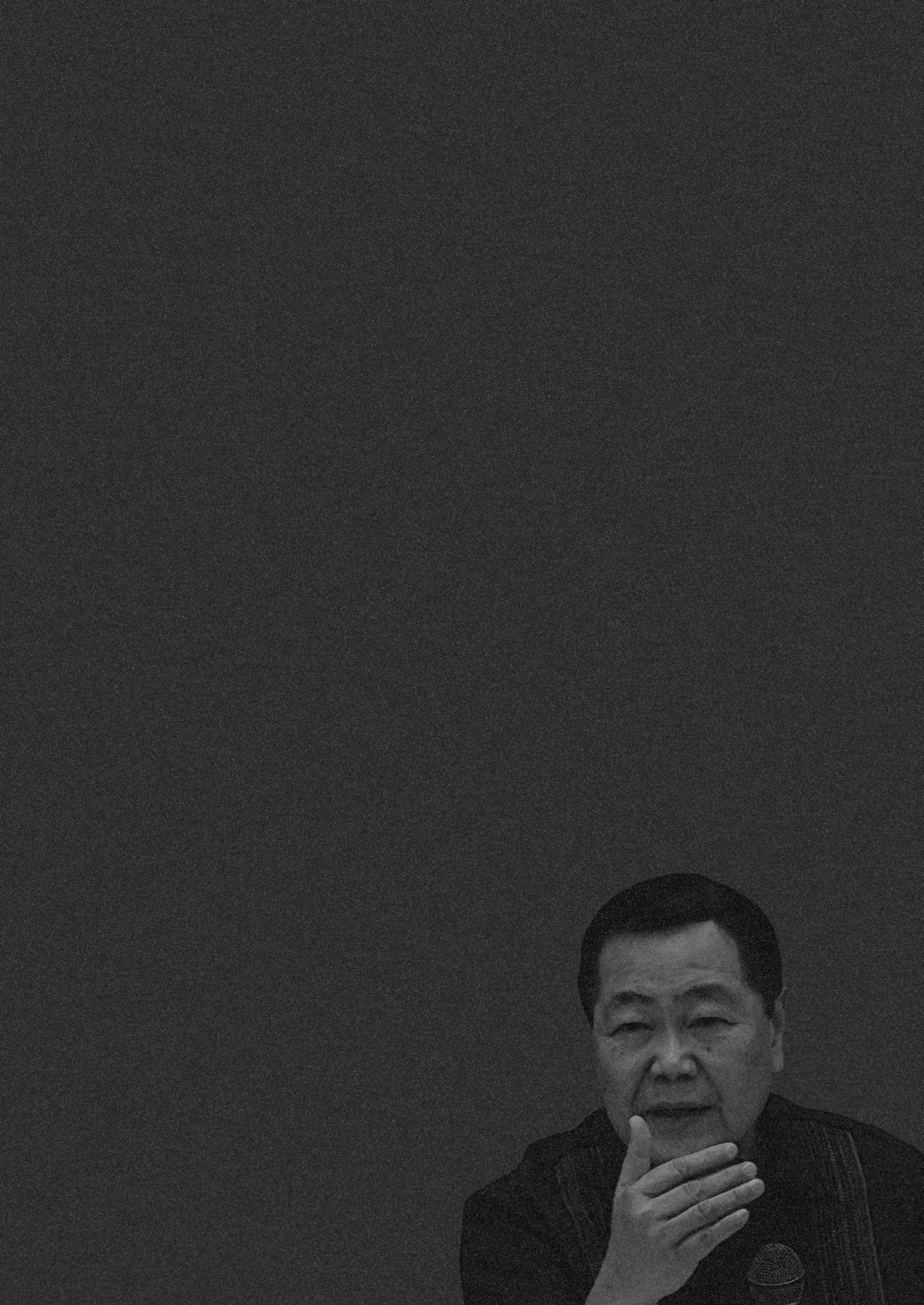
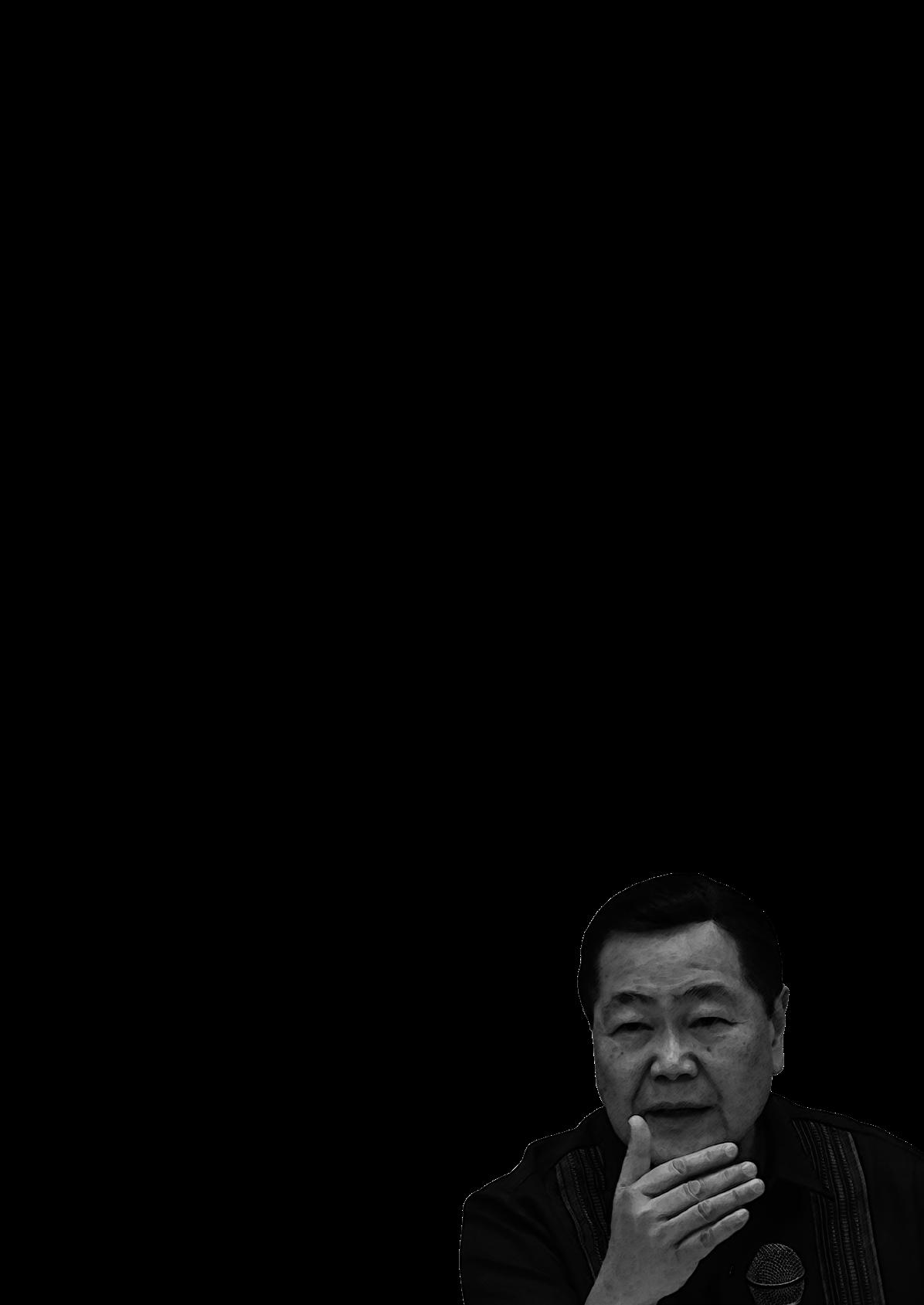
“It cannot be denied that toxic disinformation on the Internet can incite violence and other unlawful acts.”
other Filipinos who have sided with China on the West Philippine Sea issue. They consistently support China’s encroachment on the Philippine exclusive economic zone in the West Philippine Sea. They obviously belong to troll farms financed by China. Facebook at least has taken some action. The Philippine Daily Inquirer reported on 21 September 2020: “Social media giant Facebook has shut down several fake Facebook accounts and pages the contents of which were supportive of President Rodrigo Duterte and the possible 2022 presidential bet of his daughter Davao City Mayor Sara Duterte Carpio. The fake accounts were traced to individuals from China’s Fujian Province.”
Inquirer also quoted Nathaniel Gleicher, head of Facebook’s security policy, as saying that the pages and accounts had engaged in coordinated inauthentic behavior, and had their postings about global news and matters relating to the West Philippine Sea and operations of the United States Navy in three languages: Chinese, English, and Filipino.
Troll farms were active in the May 2022 national elections, as they were active in the 2019 and 2016 polls. Troll farms can destroy any candidate by relentlessly spreading libelous comments and disinformation about the candidate on online platforms. The intimidating presence of troll farms in our national politics is real and extremely disturbing. This week, Elon Musk, the richest man in the world who has just bought Twitter, announced that Twitter intends to eliminate fake or fictitious users. There is, however, a wide gap separating intention and implementation. We will have to wait and see if Twitter will actually walk the talk.
Online platforms are publishers. However, in the United States, online social media platforms like Facebook, YouTube, and Twitter—unlike traditional media like the New York Times—are not liable for their users’ libelous comments under the Safe Harbor clause in Section 230 of the U.S. Communications Decency Act of 1996. There are moves in the U.S. Congress to repeal or amend section 230 and place online social media platforms in the same category as traditional media. But so far, this has not gained traction due to opposition by the online platforms themselves.

In the Philippines, social-media platforms can be held liable for the libelous comments of their users, just like any print, TV, or radio outlet. However, there is still no Philippine jurisprudence holding such platforms, foreign or domestic, liable for libelous comments of their fake or fictitious users. In the Philippines, online platforms both social media and traditional have allowed fake or fictitious users to post clearly libelous comments and disinformation to generate interest and traffic to their platforms.
Public officials or public figures libeled online by fake or fictitious persons can of course sue the online platform as publisher. However, these public officials or public figures hesitate to file libel cases because they have to overcome the presumption of good faith. The burden of proving malice is on the libeled public officials or public figures.
The law must be amended so that malice is presumed on the part of the online platform if the libelous comment is made by a fake or fictitious person who the platform has allowed to post without securing his real identity. Until the law is amended, or until there is jurisprudence establishing a presumption of bad faith, online platforms in the Philippines will not bothered by libel suits for comments posted by their fake or fictitious users. This has led to the proliferation of all kinds of libelous comments and malicious disinformation on online platforms against opposition politicians. The use of fake or fictitious names on online platforms to libel a person is, per se, proof of malice, and this should be written into the law. The use of fake and fictitious names also encourages the spread of disinformation on online platforms. We are all for freedom of expression, but we are also for the truth and for a level playing field.
Anyone who imputes on online platforms a crime or derogatory act on another person must disclose his real identity to allow the libeled person legal recourse. The defamer must not be allowed to hide and escape accountability behind a fake or fictitious name. The burden must be placed on online platforms to require users to disclose their real identity, country of residence, and address. Such information can be given to the libeled person upon request to allow him to exercise his legal remedy. If the online platform allows a user to use a fake or fictitious name without securing his real identity, and such user posts libelous comments against a public official or public figure, that malice should be presumed on the part of the online platform meriting triple damages.
A law requiring online platforms to secure their users’ real identities will minimize not only libelous comments but also other kinds of toxic disinformation since those thinking of posting such will be more circumspect. If their identities are known or can easily be known, they will think twice before spreading toxic disinformation because they will have to personally defend their posts.
There is no infringement of freedom of expression by requiring online platforms to secure the real identities of their users. In conferences like we have today, or in webinars, those who comment are routinely asked to state their names and affiliations for the sake of transparency and orderliness. The audience would like to know

“A law requiring online platforms to secure their users’ real identities will minimize not only libelous comments but also other kinds of toxic disinformation since those thinking of posting such will be more circumspect.”
who is speaking and they would also like to know or hear from other different groups. There is no infringement of freedom of expression in asking speakers to state their names and affiliations. The speakers are free to express themselves even if they disclose their names and affiliations. Nobody has ever complained that disclosing one’s name and affiliation in conferences and webinars violates freedom of expression.
The gap in the existing libel law was supposed to have been closed with the approval by the previous Congress of the bill entitled SIM Card Registration Act. Senator Frank Drilon introduced in this bill a very important amendment, requiring social-media companies to require disclosure of real identities before anyone is allowed use of their platforms. This single amendment would have stopped in one bold stroke unbridled libelous comments and minimized disinformation on online platforms. I was hoping that President Duterte would not veto the bill. But in the end he did, because obviously, he did not want the troll farm supporting him to be legislated out of existence.


The present Congress recently passed, and President Marcos Jr. has signed into law, Republic Act 11934, which requires all users of Subscriber Identity Modules or SIMs to register their real identities with the telecommunications company serving them. All existing cellular-phone users are covered by this new law. However, this law does not apply to online platforms, unlike the bill vetoed by former President Duterte. So while the new law will reduce the direct use of cell phones in scams, libelous comments, and disinformation, it will not stop their rampage on online platforms. That’s the big loophole in R.A. 11934.
There is really no reason to differentiate between users with unknown fake or fictitious identities who scam, libel, or disinform others using online platforms, and those users with unknown fake or fictitious identities who scam, libel, or disinform others using cellular phones. In both cases, users hide their real identities, giving them a sense of impunity. In fact, the bulk of scams, libelous comments, and disinformation are perpetrated by fake or fictitious persons. But the online platforms they use—Twitter, Facebook, YouTube—are also available on cellular phones. They can even opt to email, which, again, can be accessed on cell phones.
By limiting the mandatory disclosure of identities only to cell phone users, R.A. 11934 has left a big hole for fake or fictitious individuals to continue sending scams, libelous comments, and disinformation to cell phone users. Clearly, R.A. 11934 will fail because of this big loophole. If there is an urgent need to stop or curb scams, libelous comments, and disinformation through the use of cellular phones, there should be an even more urgent need to stop or curb scams, libelous comments, and disinformation through the use of online platforms. We should continue to try convincing our legislators to extend the application of R.A. 11934 to these platforms. This will give aggrieved persons or parties a legal remedy—it may even be the ultimate legal solution—and enable them to sue those who scam or libel them using online platforms.
I am a firm believer in freedom of expression. I am not in favor of banning foreigners in foreign lands to post com-
ments on online platforms in the Philippines, no matter how offensive their comments may be. But these foreigners must disclose their real identities, addresses, and country of residence in the same way that we Filipinos, when we write columns or letters to the editor, are asked to disclose our identities and addresses.
Right now we are faced with a situation where the absence of disclosure of the real identities of online platform users will heavily influence the results of the 2025 national elections and succeeding elections. How do we immediately address a problem of this magnitude that can gravely endanger our democratic way of life? The interim solution before a mandatory legislation is enacted is to file civil and criminal cases for libel against publishers of online platforms. I commend Senator Kiko Pangilinan for filing a cyber libel case against Google and YouTube. It will take a while before this and similar cases reach the Supreme Court for a final ruling. However, there is no other choice but to use the courts and existing law while pushing for a mandatory legislation. These cases should establish that online platforms are presumed to have acted with malice if they allow the use of their platforms without requiring the users to divulge or reveal their real identities.
The ultimate and permanent solution is to enact a law mandating users to reveal their real identities to online platforms in the same manner that users of cellular phones are now required to disclose their real identities to the telecom companies that service them. Such a new law should also establish a presumption of malice on the part of the online platform if it fails to require the person committing the libel to register his real identity. Let us all work to convince our legislators to enact such a law.


New York, U.S.A.
Panel talk delivered via video link on Day One (12 November) of the 14th CALD General Assembly held in Iloilo City, Philippines
The Philippines is not unique in terms of having battles over history and memory. And the debate, debating or revising, or reinterpreting history is not necessarily a bad thing. Here in the United States, and in many European countries, monuments are being toppled and museums are returning looted art from former colonies. Long-dominant narratives of racial superiority and imperial glory are being interrogated and overturned. There is a call for an accounting of the sins of the past, and for the silenced and the dispossessed to reclaim their history. At the same time, there is a backlash against that backlash.
In the United States, the no-
tion that the southern U.S. States fought the Civil War to defend states’ rights and their way of life—that slavery was benign—is getting a new lease of life in the demands for racial justice. In Ukraine, the war is being fought not just on the battlefields in the south and east of the country, but also over history. Russian President Vladimir Putin justifies his war by saying there is no history of Ukraine separate from Russia. Ukrainian statehood, therefore, is fiction. In Hong Kong, China is rewriting textbooks claiming that Hong Kong was never a British colony, that China never ceded sovereignty, and that Hong Kong culture is the same as Chinese culture. In both these cases, history is being manipulated to make claims of power and legitimacy and to justify domination and suppression.
It’s true that there is an education gap in the Philippines. But it is also true that we see this lack of critical thinking and the allure of these kinds of distorted historical narratives in many other countries on both— on many sides —- of the ideological divide. Rich countries, where educational systems are so much better, are not immune to historical distortions.
In India, which maybe is much closer to us in terms of educational levels, Narendra Modi harks back to a golden age of Hindu glory. He has appointed a committee of scholars to write a ‘Hindu First’ version of history that says Hindus were descended from the land’s first inhabitants. Therefore, they have primacy as citizens. The vision of a secular and pluralistic India, one where Hindus, Muslims, and those of other faiths can live harmoniously, is under siege. Seventy years ago, this vision had united Indians and animated the struggle for independence from British colonial rule.
Now I know that this is an audience of liberals. And I know that you are not concerned when statues of colonialists and white supremacists are being taken down. You’re
concerned when populists worldwide weaponize history, when they use narratives—the ‘Golden Age,’ and victimhood by liberal elites—to pursue anti-democratic goals. The question that we all have to grapple with is, why have these narratives gained credence? Why have they convinced many people in many different places with different educational levels and different histories and different democratic institutions? Why do they now have the ring of truth?
It’s true that disinformation, operations, propaganda, troll armies, et cetera are all partly to blame. But shouldn’t we also consider that some of the faults lie in the failure of democratic governance to address poverty and inequality? Should we not also look at how citizens have been disillusioned by widespread corruption in public office, and with open societies and open markets that enriched and empowered the global elite, but left so many others in misery? To many, the story of democracy seemed out of sync with lived reality. It was just a fantasy. In the Philippines, the Marcos myth filled a narrative vacuum. Democracy no longer excited the public, as it had in the years after People Power. Instead, anti-democratic narratives like those propagated by Duterte and the Marcoses resonated among disillusioned and disenfranchised citizens. Like Duterte, like the Marcoses, frustrated citizens now see themselves as victims of the liberal elites.
So how do we fight back against a kind of historical revisionism that allows popularly elected leaders to elude accountability?
Justice Carpio talked about fact-checking, media literacy, and all that. They’re good to do, and they should be done. But I think they have limited efficacy, especially if these efforts are done by liberal media and liberal institutions because they are seen as partisan. Exposing disinformation techniques is great, as is campaigning against social platforms and the way they manipulate public discourse. All those are necessary, but they do not suffice. Insisting on one true version of history also doesn’t suffice because the reality is that history from the beginning of time has always been contested and revised. What we need to do is to examine dominant narratives, and analyze why they are so powerful, why they resonate among so many people. When the Marcoses say they are victims of the liberal establishment, we laugh, right? But that seems real to so many other Filipinos. I am glad that there is now a lot of self-reflection on the
part of activists, journalists, politicians, artists, teachers, and scholars who are shaken by Ferdinand Marcos Jr.’s election, and realize the big gap in public understanding, public history, and public education.


A new generation has grown up with no memory of dictatorship. The textbooks either normalize the Marcos era—Marcos as just another president—or extol its supposed achievements, such as the roads and bridges built. But they make no mention of corruption, or human rights abuses. The activist or progressive version of the Marcos years, meanwhile, is sometimes no more nuanced. It focuses on repression and resistance.
Educational efforts should not just correct disinformation, but also present a nuanced history. Filipino historian Filomeno Aguilar Jr. says that scholars need to dig deeper into the historical record in order to provide truthful and complex narratives of the dictatorship. It wasn’t all darkness; neither was it all light. There was resistance for sure, a lot of it very fierce and very brave. But there was also complicity—whether by the elite, the middle class, or the poor. The seduction by strongmen cannot be denied and deserves more scrutiny. Moreover, certain sectors of the society benefited from the Martial Law regime; land was redistributed to rice farmers, public funds were poured into infrastructure projects, and the economy grew in the early Marcos years. As one of the late president’s men said, Marcos believed he could have a vision for society and still loot it.
What we need to do is tell and teach nuanced history that accounts for the failures of dictatorship, and also the flaws of democracy, the resistance to authoritarianism, and our continuing efforts to build a just and democratic society. This requires all of us to be involved—not just journalists, teachers, or activists.
All of us should be involved in rethinking, reimagining, publishing, archiving, defending, having conversations and digging into our historical past, and having conversations among ourselves. What does our past teach us about the ways forward? What lessons can we learn from history so that we are not imprisoned in myths of the golden age or forever be in resistance, but so that we can move forward in our search for a democratic society?
“To many, the story of democracy seemed out of sync with lived reality. It was just a fantasy.”


Closing Keynote Address delivered via video link at Day One (12 November) of the 14th CALD General Assembly held in Iloilo City, Philippines
The first thing to be said about disinformation is that it’s nothing new. People have told lies and half-truths for political purposes since time immemorial. But this practice has now begun to threaten the future of democracy—as we saw in the United States this week when Republicans argued again that Joe Biden stole his election and that he was not legitimately elected President. And it is even beginning to threaten life on earth.
World leaders are meeting in Sharm el Sheikh, and one of the challenges they face is widespread denial of damaging actions contributing to climate change. The Scottish philosopher Thomas Carlyle told us that “a lie cannot live”; perhaps he just didn’t know how to tell them.
Because the second thing to assert about disinformation is that sadly, a lie can live for quite a long time and it can do a lot of damage.
Sir of the Alliance of Liberals and Democrats for Europe PartyWhat Carlyle meant of course is that a lie cannot live in the face of truth. We liberal democrats have a great task in marshaling and presenting the truth. But hear a word of warning: If I may, truth suffers less from understatement than from exaggeration. Do not fall into the trap of the enemies of truth. Just tell people the facts, plain and simple. Trust the people to distinguish. Normally, liars will do themselves more damage than anything we could throw at them.
Third, be alert. “A lie is halfway around the world before the policeman has its boots on,” U.S. novelist Mark Twain, is said to have written, although that assertion itself may not be true. Certainly, though, the quote is at least 100 years old and created long before the age of electronic media. Among other things, it tells us that we need more, and smarter, policemen. In the United Kingdom, at the time of the Brexit referendum, we saw the establishment of an organization called Full Fact. Full Fact is run mainly by volunteers and funded mainly by crowdfunding. It takes claims made by politicians, journalists, and others in positions of power, both in government and in opposition. And it explains through its website and through its electronic newsletters, what, if any truth, lies behind those claims. It is a reaction of course dealing with lies already spreading, but it is a nonetheless useful resource for those seeking to establish and search for the truth.
And finally, get smart. If algorithms can be used to deny or distort the truth, they can also be used to spread the truth. We need to modernize our campaigning methods. Liberals are not always the best for this. Our opponents tend to have more money and more vitriol. But if we put our minds to the tasks, if we bring together the bricks of effort and the mortar of persistence, we can and we will prevail.
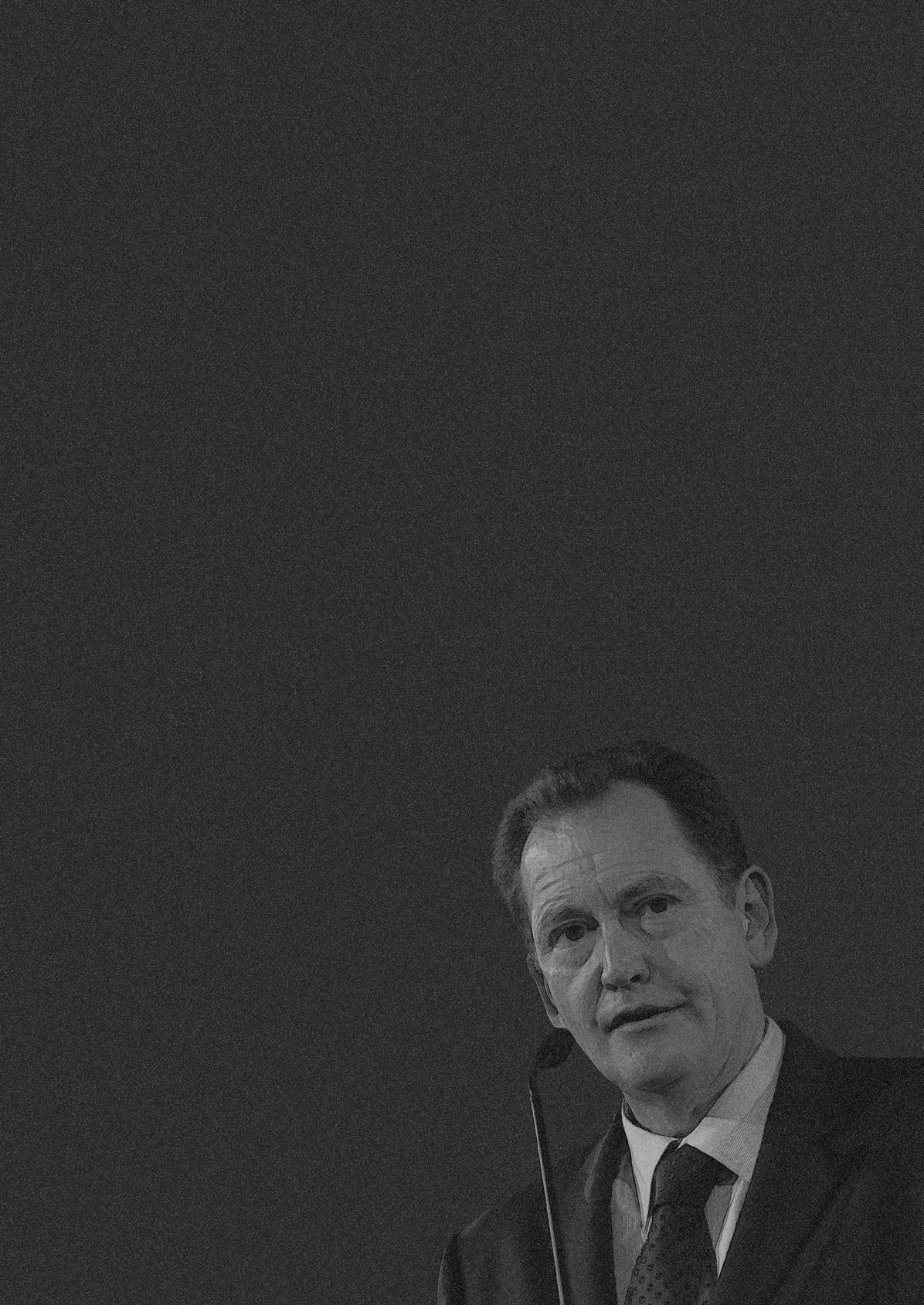

“Just tell people the facts, plain and simple. Trust the people to distinguish.”
Opening Remarks at Day Two (13 November) of the CALD General Assembly held in Iloilo City, Philippines
I remember a New York Times article in the run-up to the May 2022 presidential elections that described the Philippines as a “nourishing ecosystem for political lies.” It further said that the Philippines was once described by a Facebook executive as “patient zero” in the global disinformation epidemic. And prior to this, I’m sure you remember the whistleblower Chris Wylie who exposed the Philippines as Cambridge Analytica’s petri dish for interfering in and manipulating election processes in other countries.

The fact that the country has earned such notoriety indicates that the problem of disinformation is not new. In fact, it may be firmly in place in our digital ecosystem, undermining our politics, and pretty soon the other aspects of our lives.
Our failure to stem this problem early on has led to what the University of the Philippines fact-checker Tsek.Ph described as the “relentless and widening stream of falsehoods spewed out in multiple platforms and formats” in the May 2022 elections that was “unprecedented in Philippine history”. “It closely resembled,” Tsek.Ph went on, “what U.S.-based thinktank Rand Corp calls the ‘firehose of falsehood’ strategy that is marked by high numbers of channels and messages and a shameless willingness to disseminate partial truths or outright fictions.” It was indeed a heavy price to pay. If we allow this disinformation contagion to fester and spread further, the damage will not stop there.

Disinformation can undermine our democracy in so many other ways. As we saw in the recent elections, it can erode the concept of informed choice, which lies at the
heart of credible elections, as voters are fed incorrect information mixed with false narratives and conspiracies. It can also hurt, as again we are seeing in the aftermath of the election’s electoral legitimacy as the results and their fairness are questioned. As we shockingly observed in the recent U.S. midterm elections, disinformation can polarize societies and distort public debates. Executive actions, legislation, appointments, and foreign policy are all viewed through vastly contrasting perspectives with no clear referee of facts and evidence. The dire consequences: truth becomes subjective instead of fact-based, legitimacy is undermined and accountability is difficult to exact.
Florencio ‘Butch’ Abad Former Philippine Budget Secretary and Former CALD ChairpersonDisinformation can be manipulated as an effective vehicle for both domestic and foreign anti-democratic actors to spread harmful narratives that exacerbate pre-existing social division and drive individuals to what are called counter-factual communities (or online communities of tens of thousands who produce content that not only tells you, you are right, but also builds a web of pseudo-knowledge that you can draw from to defend your belief no matter how misplaced or erroneous they are) or toward undemocratic alternatives, such as authoritarian populist movements or extremist organizations. Finally, it can undermine national security and effectively weaken one’s country’s foreign policy goals and partnership, as well as promote hostile adversaries. This is especially true in the tense geo-political situation we find ourselves in.
How should democracies respond to this multi-layered and rapidly evolving disinformation ecosystem that is particularly challenging to deal with?
In the near term, the government, as it is being done in Europe and the United States, can, in a limited way, establish task forces to monitor disinformation attacks, track false narratives, and inform the public and policymakers. The objective is to coordinate activities to fight disinformation, alert policymakers, and, as needed, liaise with social media and the media. Together with policymakers, government can also adopt legislative and regulatory tools to induce more transparency and accountability in the digital domain.
But what happens if government does not act or, as in our present predicament, is itself suspect? The private sector, multilateral agencies, and academic institutions can work together to support civil-society groups and media, such as Tsek.Ph, Vera Files, and Rappler, which, through fact- checking, expose malicious activities and inform government and social-media companies. In addition to fact-checkers, funding and technical support can also be extended to truth-seeking communities that emerge around specific issues, such as EJKs (extrajudicial killings), ill-gotten wealth, and martial law. They are groups of Internet users heavily engaged in informing themselves with particular issues while guarding against manipulation by others, or being misled by their own preconceptions.


On top of supporting the growth of crowds of investigators who help build resilience against disinformation, support for a broader approach that helps society develop the capacity to actively contribute to efforts toward transparency and accountability is also critical. Social-media companies, for example, should be made responsible for preventing and getting ahead of malicious manipulation of their platforms. One initiative along this line is the digital-media literacy programs
that enable young people to engage positively with issues they face and then moving into online investigation. The program does not only empower them but gives them skills they can use throughout their lives.
The goal of all these efforts and initiatives is to enable a plurality of independent voices to unleash a “firehose of truth” to counteract the falsehoods propagated by malicious groups.
Over the long term, the challenge that lies ahead is even more difficult and complex. Due to the limited time, I can only stress that we must make our democracy—its institutions and processes—more real and meaningful to our people. Serious inequities in the distribution of wealth and power, poverty, and exclusion provide fertile ground for resentment and desperation. This condition in turn makes the poor and marginalized groups and communities extremely vulnerable to agitation and manipulation by extremist groups and purveyors of disinformation and false narratives.
“The dire consequences of disinformation: truth becomes subjective instead of fact-based, legitimacy is undermined and accountability is difficult to exact.”
All of us here are not new to conversations about how, indeed, once and for all, we can expose and discredit disinformation. It is a huge task—an understatement of the decade, maybe. The disinformation machinery that we are up against has long decades of historical distortion, and years of fake news, long established a foothold in our technology, in our digital spaces, and in the way we process information.
Many of us continue to be targets of this machinery, of this deliberate campaign to distort facts and manipulate the truth. I’m certain that, especially in the lead-up to and during the last elections, our offices have reached out to each other, to help
each other fight false news and mis- and disinformation hurled against us. We have shared with each other links, photos, social-media cards, and videos that we may use to debunk any or all comments, posts, or vlogs that spread lies about our politics, our work, and our lives.
At this point, the attacks have become predictable. We can already identify the top issues that paid trolls utilize, the narratives they perpetuate, and the repeated scripts they churn out.
We know that the moment we say something sharp or critical about the past and present administrations—no matter how policy-focused, no matter how constructive, no matter how true—the trolls are prepared to strike, armed with their spliced videos, their memes, their quote cards. We then expect paid political vloggers, influencers, and mouthpieces to show up, weighing in on issues, always ready to defend their leaders and attack ours at all costs.
In a Harvard study entitled “Public Parallel Spheres: Influence Operations in the 2022 Philippine Elections,” in which former Vice President Leni Robredo was one of the reactors in the presentation, the researchers said that while there was a continuation of disinformation innovations from 2016 and 2019, influence operations on social media became even more sophisticated in the run-up to the 2022 elections, enabling the construction of a parallel political reality. The study cited the pro-administration political reality, in which a fully funded content production painted the ruling family as the “real victims” of the EDSA People Power Revolution, the
 Ana Theresia ‘Risa’ Hontiveros-Baraquel Senator, Republic of the Philippines
Ana Theresia ‘Risa’ Hontiveros-Baraquel Senator, Republic of the Philippines
so-called “liberal elites.” So I’m sorry my dear LP and CALD, and allies, your ideology was made a counter-hero. Theirs went mainstream, even in the form of a cinematic production.
What’s worse is that the disinformation doesn’t end and stays online. It spills into and affects our lives, our relationships, and our communities. For example, complaints have, in fact, been filed against many of us, including Senator Leila de Lima, because of false information on social media.
For the dear allies and friends from other parts of our home region, who may not have heard of this story, in July 2019, the Philippine National Police implicated several of us in an anti-Duterte “Bikoy” video—a series of videos, actually—that tagged members of then President Duterte’s circle as members of drug syndicates. The videos were then used to spread disinformation about us supposedly pushing the general public into mass protesting in order to unseat Duterte as President. An “inciting to sedition” complaint was even filed against us; thankfully and rightfully, we were cleared of that spurious complaint.
Senator Kiko Pangilinan has been a target of disinformation campaigns as well, particularly by YouTube vloggers, who went so far as spreading false information about him in regard to the agricultural issue that he mentioned earlier, even about violence against women. Senator Kiko—one of the most faithful allies of the women’s and feminist movement here in the Philippines for women’s rights and welfare. There was also fake information that a case had been filed against him for these spurious issues.
I commend again Senator Kiko for filing a cyber-libel complaint against these individuals, as well as against Google, for not removing these defamatory content even after 82 of these had already been reported to the tech company. No one, no individual, no company should get away scot-free with acts like this.
Senator Kiko, along with former minority Senator Frank Drilon, also filed Proposed Senate Resolution No. 953, directing the then Senate Committee on Constitutional Amendments and Revision of Codes to conduct a review, in aid of legislation, of the country’s existing criminal laws, to consider the rise of social-media platforms and the rapid advancement of technology.
In one of the hearings on Senator Kiko and Senator Drilon’s resolution, resource speaker U.P. professor Yvonne Chua also revealed that former VP Leni had been the biggest victim of disinformation. Every week, the negative messaging was all about and focused on
VP Leni. There was also a deluge of positive messaging, albeit false and misleading, promoted in favor of the then-presidential candidate and now president. This already shows us the dichotomy of realities that we see on our feeds.
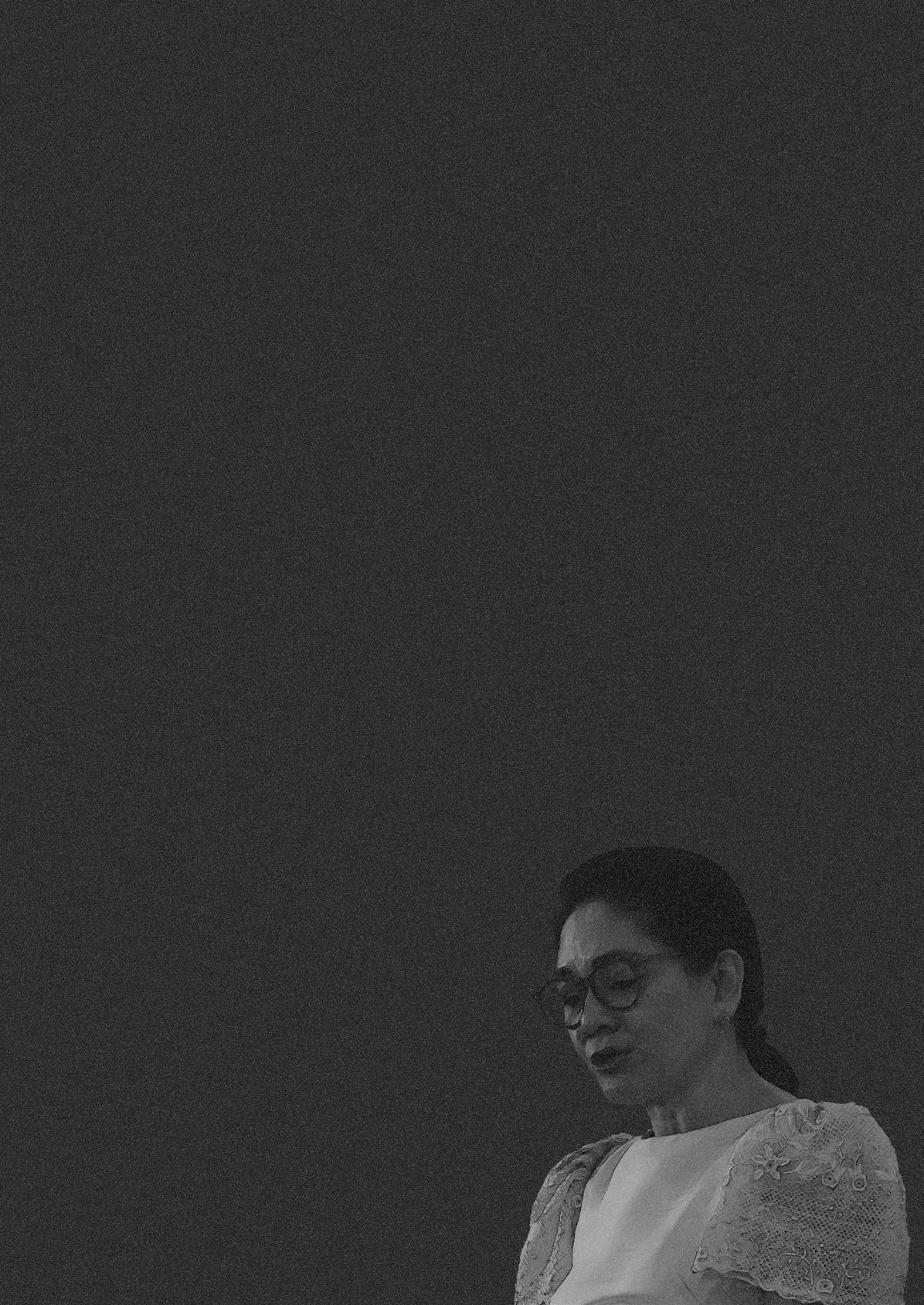

That Senate hearing also shared findings from another academic study titled “Architects of Disinformation,” which tagged ad agencies and PR strategists, hired by politicians, to be chief architects of networked disinformation campaigns. The study also said that disinformation workers—the paid trolls, the paid influencers—are all driven by financial, political, and psychological factors. The disinformation machinery has indeed been turned into a money-making industry. When people are painfully reeling from the health and economic effects of COVID-19, when Filipinos have long suffered the lack of decent jobs and livelihoods in our country, who can really completely blame them if they accept work in this industry?
Fighting disinformation will take more than our individual efforts to take down posts, report platforms, or bust bots. Besides holding disinformation architects to account, we must also address the conditions that allow this industry to exist: The level of poverty, the level that encourages disinformation work, the lack of literacy that permits the easy spread of mis- and disinformation, and the culture that allows hate speech, deceit, and lies.
Even beyond politics and governance, around the world, the very real implications of disinformation are also seen in the spread of anti-vaccination information on social media, creating serious implications for public health and our regional and global
“What’s worse is that the disinformation doesn’t end and stays online. It spills into and affects our lives, our relationships, and our communities.”
fight against COVID-19. In Asia, Thailand’s “Anti-Fake News Center,” under the Ministry of Digital Economy and Society, recorded around 500 fake news stories about COVID-19 just between January and June 2020. Indonesia’s Ministry of Communications and Informatics identified 1,513 COVID-19 hoax posts between January 2020 and April 2021. The Vietnamese government also discovered 650 cases of mis- and disinformation between January and May 2020.
It is not an exaggeration to say that disinformation has life and death consequences. In India, a fake news story claiming that strangers were sedating and abducting children led to extreme violence and mob killings of individuals. The hoax was translated into regional languages. It reached rural areas where digital literacy is even lower. It spread like wildfire through WhatsApp. In just two months, at least 20 people were killed, among them homeless people, picnic goers, and an elderly woman.
These real-world incidents only show the urgency of our task. We now have to continue to take concrete, actionable steps that we can all truly commit to and invite more Filipinos and Asians to commit, too. I know this is difficult when we also have other, perhaps more pressing, issues that we advocate for. But at this point, we really are left with no choice. If we allow disinformation to continue to flourish, democracy itself—the very foundation of all our work, be it politically organizing on the ground, development work such as what Angat Buhay is continuing to do and others—this will continue to wither under attack and eventually be reduced to a complete shambles.
We have to consistently engage with our allies, networks, and supporters. We cannot just tap each other when elections are coming. We cannot just come together during those significant events. We have to band together, consistently, in all things big and small.
In 2020, I actively participated in the Senate inquiry into allegations involving the siphoning of health insurance funds, where it was alleged that PhP15 billion were pocketed. The then Senate Minority, led by Senator Frank, with Senator Kiko—and even from prison Senator Leila with her tireless handwritten communications—were all very active.


During the height of this investigation, as expected, fake news after fake news spread on social media. Facebook, You-
Tube, and dubious websites, as if in a synchronized dark dance, were suddenly filled with content that had distortions of all kinds of facts to protect the past administration and implicate others, including me.
Our office then started creating all forms of materials—from infographics to short videos—that debunked all the false information. We compiled them in a Google drive, shared these with allies, volunteers, and networks, and created group chats to closely coordinate which posts to reply to or report. We should be able to make this kind of collaboration regular—not only when we are in the midst of a national issue, but in our daily lives, in small and steady ways.
This kind of collaboration was even more pronounced during the recent elections, especially in our Pink movement. Numerous people lent us their talents to create content to highlight our strengths, to challenge the lies, and to defend the truth. The level of creativity for this movement was, like Kiko said, one we had never experienced in our lifetime.
How can we keep the fire, the creativity of all of us, all of these people? How can we channel this enthusiasm into our fight against disinformation? How can we make media, digital literacy, and digital citizenship so exciting that wider sections of the public would want to join our cause?
During the campaign, the delight of the rallies was also in part because of the music, the dancing, and all kinds of art. Perhaps we can start hosting regular, entertaining events in which the public can join, where we not only talk about strategies on battling mis- and disinformation, but where everyone can also simply relax and enjoy. Where we can offer momentary relief from difficulties. Where we can stoke each other’s hopes.
We also need to know more and more whom we want to speak with, learn each other’s language, and meet where the people are. If they are on TikTok, we need to amplify our presence there. If they get their news on YouTube, we need to start uploading even more information there. If Facebook messenger is where everyone is talking, we should also be sustaining and widening conversations there.
I cannot stress enough how we here today, including our supporters and spheres of influence,
“It is not an exaggeration to say that disinformation has life and death consequences.”
should consciously remove ourselves from the temptations of a political reality that affirms only our own beliefs and biases. In the same Harvard study I cited earlier, the authors said that the Kakampinks also had “truth-denying tendencies in their political reality.”
The research used the “False Asia” trending incidents as an example, when the phrase went viral on Twitter every time Pulse Asia, an established survey firm, released data that were not in our favor. The researchers said that this parallel political reality also included personalities who dismissed voters as brainwashed by propaganda, and therefore, having no free will. The authors of the study argued that “such constructions dehumanize(d) voters by portraying them as deficient citizens incapable of making political judgements, therefore unworthy of engagement and deliberation.” They further emphasized that this rhetoric only affirmed the populist authoritarian or administration narrative that the media, fact-checking organizations, and any other dissenting voices are “anti-masa” or against the majority of Filipinos who are poor and powerless.

This is part of the reality, the truth, we have to face. Often, the truth is like medicine—bitter, but clarifying for the tasks ahead. So I hope we take these argumentations seriously and reflect on them, as we continue building our coalitions, with as many Filipinos as we can, in this great humanist project and among whom we need to count more adherence, as we continue building our coalitions toward a more mature democracy.
We should also accept that inasmuch as we see technology and social-media giants as contributors to the failures of our democracy, these remain to be platforms that the general public, the people we serve, our citizens, enjoy. If we are to build a stronger defense against disinformation, we have to immerse, listen, and talk to the public in a way that they can relate to, and find joy and hope in.
We in the opposition must strive to change the political environment in order to win the hearts and minds of the people. We must change the political environment itself, change and improve our relative strength within that political environment, change and improve the public perception of our strength. In order to win the hearts and minds of the people, we can in fact use these tools—the Internet, technology, and social networks—to not only broaden our appeal to the majority of the Filipinos, including those who did not vote for our candidates, but also to protect our democratic values for the long-term.
We have a monumental challenge ahead of us: the challenge
of altering the political equilibrium, which in the last six years, has been stacked against us. But since when have we not been up for a fight?
Crucially also, as the study mentioned, we have to admit that for far too long we have been each other’s sounding boards to the point that perhaps sometimes we couldn’t recognize our own prejudices, our own blind spots. If we are to have a stronger fighting chance against disinformation, if we are to strengthen our commitment to democracy, we must ensure that our actions and conversations in conferences like this, in political spaces like this, continue to expand beyond ourselves.
We should go beyond our usual ways of doing, of organizing, of mobilizing, to continue to build alliances, movements of parties, and other connections that coalesce with and support each other in making democracy real—not just politically, but economically and socio-culturally as well. That fight for substantive democracy is arguably the most important content of our political struggles and of our political communications.
We have to start, and continue to start again and again, before it’s too late. We have learned many painful and costly lessons in the past, and we now have again these three years, these six years and beyond, another prime opportunity to grow from those mistakes and continue to construct a democracy that is truly felt by all.

If disinformation is a great threat to democracy, how do we push back? How do we reconnect to facts? How do we create solidarity with the millions who believe in what they think were the ‘Golden Years’?

The first and continuing work is empathy. It is easy to be angry and contemptuous of the people who have been misled by disinformation. But they are not the enemy. The enemy are those who have intentionally, systematically, and massively lied to us. The duty of those who are woke to the process of truth-telling is to awaken those who are not.
At the recent CALD conference on democracy and disinformation, journalist John Nery framed the spread of disinformation to the spread of disease—an infodemic, so to speak. Nery said that inoculation or vaccination is the strategy. This means we have to sharpen our ability to recognize the six main drivers of disinformation: trolling, discrediting, emotion, polarization, impersonation, and conspiracy. More importantly, we have to share this knowledge with as many people as possible, especially to those who have been infected by or are vulnerable to disinformation.
To know who spreads the virus, it is important to unmask the trolls. Former Supreme Court Justice Antonio Carpio proposes to require social-media platform users to register their true identities. This would deprive disinformation spreaders of the power to hide behind made-up characters.
In our objective to reclaim democracy, Jason Gonzales, Director General of the Liberal Party of the Philippines, assessed the disinformation network in the context of the May 2022 elections and came up with a formula on what needs to be done: A broad coalition plus effective content at scale, plus powerful narratives.
We need a bigger megaphone, a broader network coalition from different sectors of society, from Class A to D.We need to continue with our tao sa tao, puso sa puso (person-to-person, heart-to-heart) campaign, which we have done in the last elections. Phil Bennion, Vice President of Liberal International and a victim of the disinformation drive that preceded
Brexit, said that we have to be aggressive and get into different channels to counter the lies as they happen on a daily, ongoing basis.
Truth tellers need to produce effective content at scale. We need an organized system of content production as well as content distribution. Let us encourage volunteers to join our ranks, our units, and our communities in BUILD Pilipinas (Bridging Unity and Inclusivity Through Leadership in the Digital Age). Our electoral campaign has generated a lot of creativity across the nation. Let us continue to produce materials from works of art, songs, dances, stories, theatre plays, and films expressing our dissent against lies and falsehoods. Let us remember that facts are not enough because they do not speak to the soul the way art and humor touch our core beings.
We need powerful stories. Claire Wardle in 2018 said, “We need to fight rumors and conspiracy with engaging and powerful narratives that leverage the same techniques as disinformation.” ‘Gets Ka Namin (We Get You),’ tagline of the clothing company Linya-Linya Philippines, encapsulates the power of relatable, connected, on-point messaging as shared by the firm’s co-founder, Ali Sangalang.

The objective of truth-telling is a process. It is exploring and asking questions. In the same CALD conference, truth teller and educator Sheila Coronel said that we have to examine dominant narratives and analyze why they are so powerful. Educational efforts should not just correct disinformation but also present a nuanced history. We need to tell and teach a nuanced history that accounts for the failures of dictatorship but also the flaws of democracy, the resistance to authoritarianism, and our continuing efforts to build a just and democratic society.
This requires all of us to be involved. Democracy and truth need all of us.



First launched last year as a podcast series, The Great Asian Pushback is now in book form. A multi-media project showcasing 13 Asian changemakers and their inspiring stories, its book version was launched in November during CALD’s 14th General Assembly in Iloilo City.

Philippine Senator and CALD Chairperson Francis ‘Kiko’ Pangilinan, who was among the changemakers featured in the project, wrote the book’s foreword. He said that it “takes us to a big village to listen to and learn from stories of people of diverse origins but whose history and future are interwoven… They tell their stories of protest and hope from the streets, digital highways, and even clandestine hideaways. Their unfeigned narration will take one to their grief, fury, and aspirations that make us see that the struggle, no matter how difficult, will have a clear end.”
The Great Asian Pushback in book form is CALD’s way of reaching out even more to the public—to awaken, to inspire, and to let everyone know that we can, and we are, pushing back.


East and Southeast Asian cities have been grappling with mobility issues even prior to the pandemic. But with climate change and ever-growing populations, there is even more need for smart solutions that can make public transportation available, affordable, and environmentally acceptable.

In 2022, CALD began its Smart Mobility Project that it envisioned would showcase smart-mobility solutions in the region by extending support to local government units governed by CALD member-parties. Selecting Indonesia, Taiwan, Thailand, and the Philippines as the countries to be included in the project, CALD tapped for participation member-parties Indonesian Democratic Party of Struggle (PDIP) and Nation Awakening Party (PKB) of Indonesia, Liberal Party of the Philippines, Democratic Progressive Party of Taiwan, and the Democrat Party Thailand—all of which have elected local governments under their watch.
The project will run until 2024. Its goal for 2022 was to produce a baseline study that would highlight current mobility issues in the region, as well as best practices in addressing those issues. By late December, the baseline study was ready to serve as a smart-mobility roadmap for interested local governments.
The country reports submitted to CALD form the core of the study. Green organization Environman co-founder and content director Romtham Khumnurak wrote the Thai report, while PDIP Foreign Department member Mohammad Yusuf Wuisan, Trenggalek City Mayor H. Mochamad Nur Arifin, and urban planning and public policy expert Dr. Harya S. Dillon took care of Indonesia’s situationer. AltMobility PH Director was the author of the report on the Philippines; for Taiwan, the writing team was the International Division of the Institute for Information Industry’s Ellie Kan, Hansen Derrick, and Tobias Larkin.
Miguel Karlo Abadines of AltMobility PH prepared the baseline study. It includes an analysis of emerging trends and challenges in smart mobility in the region, based on the country reports and the feedback from the participants in the CALD workshops in Tagaytay, Philippines, and Bangkok, Thailand.


Abadines observes in the study, “While Taiwan is very much advanced in its implementation and use of digital technologies, the Philippines is still at the foundational level of fixing the basics of public transportation governance and infrastructure, even as many groups push for active transportation such as biking. For Indonesia and Thailand, foundational concerns in public transportation have partially been addressed; both are now looking at smart-mobility technologies and processes to address gaps in transportation-service delivery.”
“What these case studies show,” he also writes, “is that as the respective governments of these countries attempt to respond to their citizens’ needs and address the concerns and demands for an efficient, safe, inclusive, and accessible transportation system, their struggles vary in forms and degree. Each local context is unique, and thus ap proaches to smart-mo bility implementation have been diverse. Nonetheless, there are some common themes that can be identified based on the four case studies.”

You’ll have to read the study to find out what those common themes—and more—are.



Among fellow youths, how do you [resolve/correct/ battle] disinformation in daily interactions?
When we encounter something we don’t know while listening to or communicating with someone, we sometimes just rely on the credibility of the person speaking; little do we know that we may actually be turning into victims of false information. It might be tempting to just assume the source or the speaker is reliable, but I think having your own will to research and know more of the information being fed to you is something that we, the youth, should practice on a daily basis.

In this age of the Internet and high-speed connectivity, it is only by equipping one’s mind with facts that we can spot disinformation, act upon it, and transmit reliable information. Every single piece of information is moving fast in the digital world and fact-checkers need every second to get ahead of those who spread false news.
Don’t be scared to stand up or correct somebody if you know they are in the wrong - or in this case, spreading disinformation and misinformation. I believe that the youth of today are capable of resolving disinformation since they have the digital knowledge and skills.
You can battle disinformation only if you can differentiate the real news from the fake, if you know which are facts and which are opinions. In this day and age, the answers are only a click away. And also, battle disinformation with kindness, patience, and love. In a world full of hate and war, I think people would listen to a softer and kinder voice.
Siripa Nan Intavichein, CALD Youth Chairperson Jeremiah Tomas, CALD Youth Secretary General Mengbunrong Seng, CALD Youth Public Relations Officer




The first half of 2022 seemed to be dominated by a series of unfortunate events, with the Russian invasion of Ukraine on 24 February starting the year on a very wrong foot.
CALD was soon issuing its first statement for 2022, expressing alarm over “Russia’s military aggression against Ukraine and the resulting suffering that such attack brings.” Dated 28 February, the statement also called on “concerned parties to contribute in de-escalating the tensions and in pursuing a peaceful resolution to the conflict,” as well as for the “dispatch of urgently needed humanitarian assistance.”
CALD stated that it “upholds the principles of sovereignty, territorial integrity, and equal rights of all nations as enshrined in the United Nations Charter.”
“We also recognize,” wrote CALD, “the right of Ukrainian citizens to live in peace and harmony, as well as their right to shape their country’s destiny based on their collective vision of the future.”
It would be court cases involving members and friends of the CALD family, however, that would have the Council issuing its sole resolution for the year, as well as the rest of its statements for 2022. The CALD resolution, for one, highlighted the plight of Philippine opposition Senator Leila de Lima, who by then had already spent more than five years in detention on trumped-up drug charges. A known critic of then President Rodrigo Duterte, de Lima continued to be denied her freedom even though two prosecution witnesses retracted their respective statements against her in April; several days later, one of her former aides would also recant the testimonies he had made before the Philippine Congress.
show that the lawmaker is just a victim of the Duterte administration’s vindictiveness.” They also urged Philippine authorities to “launch an independent, impartial investigation and bring to justice those responsible for the frame-up” of the senator. In addition, they appealed to the international community to continue to put pressure on the Philippine government to release the lawmaker and “uphold and defend the rule of law and democratic values, especially in the face of intensifying threats to freedom in the Philippines and in other parts of Asia.”
In the 18 May resolution thus, CALD member-parties implored the Philippine justice department “to drop all the remaining charges against Senator de Lima, given that the recent recantations of prosecution witnesses
By June, in fact, CALD was issuing its second statement for 2022, this time condemning “in strongest terms” the conviction of Cambodian human-rights activist and lawyer Theary Seng. Convicted of “conspiracy to commit treason” and “incitement to create gross chaos impacting public security,” Theary Seng had been sentenced to six years in prison.
“The conviction of Ms. Seng again demonstrates how the Hun Sen government has effectively weaponized the law against anyone who dissents and criticizes the regime,” CALD wrote in its 16 June statement “The charges against her are clearly trumped up, and her trial a sham.”
The statement then called for the immediate and unconditional release of Theary Seng and all other political prisoners in Cambodia, calling anything less a “gross injustice.”
Less than three weeks later, CALD was condemning “the decision of the Securities and Exchange Commission…of the Philippines to uphold its earlier ruling revoking the certificate of incorporation of Rappler, thus denying the digital media company of its operating license.”
of Internal Revenue filing cases against Rappler in particular.
signal a further escalation of atrocities against opposition political leaders and democracy activists, who have been bravely fighting for democracy and freedom since the February 2021 coup led by Senior General Min Aung Hlaing.”
The subject of CALD Statement 4, S. 2022, however, was the worst example yet of the lengths some governments would go to get back at their critics. Dated 26 July, the statement had CALD condemning “in strongest terms the barbaric execution of four anti-coup activists in Myanmar.”
Just the day before, the Myanmar junta had announced that Kyaw Min Yu, Hla Myo Aung, Aung Thara Zaw, and Phyo Zeya Thaw had all been hanged, the first executions in the Southeast Asian country in decades.
CALD made an appeal to the Association of Southeast Asian Nations and the rest of the international community to make the Myanmar junta “accountable for its actions,” as well as specifically called on Cambodia as “the current ASEAN chair to strictly adhere to the fivepoint consensus” and “make all efforts to meet with the National Unity Government.” The Council implored Western countries as well “to come up with more decisive action on the worsening Myanmar crisis by imposing coordinated sanctions against members of the military government.”
In its 4 July statement, CALD also noted that Rappler and its CEO and founder Maria Ressa, a recent Nobel Peace Laureate, had been the “target of political harassment and intimidation” during the Duterte administration, with government agencies such as the SEC, the National Bureau of Investigation, and the Bureau
Phyo Zeya Thaw, a former legislator from the National League for Democracy (NLD) of Aung San Suu Kyi, had participated in CALD’s 25th anniversary events in Bangkok, Thailand, in November 2018.
“CALD considers these executions as an act of state terrorism and a blatant violation of fundamental rights,” the Council said in its statement.
“These barbaric acts, the first use of capital punishment since the 1980s, could also
CALD’s last statement for the year was made jointly with Liberal International and revisited the continuing detention of Philippine Senator de Lima. It was dated 9 October, the same day the senator was held hostage briefly by an inmate involved in a jail rampage. Her hostage-taker was killed, as were two other inmates.


In the statement, the Bureau of Liberal International and CALD’s Executive Committee expressed “serious concerns” on the capability of the Philippine National Police to ensure the opposition senator’s safety and security. They added, “That she is still being detained together with suspected members of terrorist organizations is a travesty of justice, especially given the dubious charges against her. Instead of the suggested transfer to another detention facility, the Marcos administration should withdraw the remaining charges against her so she could be immediately and unconditionally released.”
marked, “The rallying cry ‘Sa Gobyernong Tapat, Angat Buhay Lahat (Under an Honest Government, a Better Life for All),’ swept the hearts of ordinary Filipinos to contribute their personal time, effort, and resources and challenge the formidable money-driven political machinery of the dictator’s son.”
CALD also commended both Robredo and Pangilinan for their “bravery, leadership, and firm resolve to stand up against the widespread disinformation and patronage politics that marked the campaign, and present an alternative vision of a government that truly works for the people.”
ulated CALD member Candle Light Party for winning four commune chief slots and 2,176 councilmember positions in Cambodia’s 5 June election. Addressed to both CLP Vice President Son Chhay and Treasurer Mardi Seng, the letter also noted that the party’s 22 percent share of the popular vote was “no mean feat considering the persecution and oppression of the members of the political opposition.”
“We believe that the gains you garnered in this election is just the start,” CALD wrote. “We trust that with your leadership and guidance, the people of Cambodia will see through the struggles and rise above the fears and threats.”
CALD’s 2022 letters, meanwhile, were prompted by more positive events. In truth, while neither Philippine Vice President Maria Leonor ‘Leni’ Robredo nor opposition Senator and CALD Chairperson Francis ‘Kiko’ Pangilinan was able to claim victory in their country’s 9 May elections, their run had inspired Filipinos from all walks of life to unite and have their voices heard amid the din of disinformation.
In letters dated 16 May and sent separately to Robredo and Pangilinan, CALD re-
Regardless of the election results, CALD said, “your campaign has ignited a special kind of energy among your people that cannot be easily extinguished during these difficult times.” It thanked Robredo and Pangilinan as well “for continuing to inspire Filipinos to make a difference.”
In Cambodia and Malaysia, CALD members and friends would win the chance to make that difference within the government. In a letter dated 7 June, the Council congrat-
A CALD congratulatory letter also made its way to Malaysia a few months later. In the letter dated 25 November, CALD congratulated Dato Seri Haji Anwar bin Ibrahim for his appointment as the 10th Prime Minister of Malaysia, as well as to commend Pakatan Harapan (HP) “for winning the largest share of parliamentary seats” during Malaysia’s 19 November polls.
“Your victory lit the fire of hope not only for Malaysians but
also for us, Asian Liberals and Democrats, who are struggling to fight the sweeping impacts of disinformation, political repression, racism, and corruption,” CALD said in the letter. “Your courage, persistence, and unwavering commitment to the causes of democracy and freedom are an inspiration to us all.”

For a year that began not quite right, CALD managed to end it with a successful General Assembly in Iloilo City, Philippines that even produced a declaration. On 13 November, CALD adopted the declaration from its 14th GA, in which the delegates resolved “to adopt truth-telling and protection as an advocacy, and to implement programs and projects to this end; to endeavor to address concerns relating to combating disinformation as individuals, organizations, or networks, particularly but not limited to the digital infrastructure, education, culture and the arts, and democratic institutions and processes; and to open lines of communication amongst the participants and other interested players, and to reconvene to further discuss the issue, and report on concrete progress made by the actors.”
A grateful CALD wrote letters of thanks to its Iloilo hosts, sending the missives separately to Iloilo City Jerry Trenas and Iloilo Governor Arthur R. Defensor Jr. In the 28 November letters, CALD noted that GA would not have been a success without the “hospitality of the people of Iloilo, particularly the students who…actively participated in the event.”
“The success of the event is the success of Iloilo,” CALD wrote. “We are happy to have organized our most prestigious gathering of the year in your beloved province. Definitely, our CALD members will keep coming back to explore more of its beauty.”

“If we don’t build resilience in terms of governance, in terms of rule of law and human rights-centered approach, we are basically going to be the equivalent of, in the history books, ‘the fall of the Roman empire’,” said ALTSEAN Founder Debbie Stothard, referring to what could be the fate of the Association of Southeast Asian Nations (ASEAN) if it fails to adapt in accordance with the needs of the time.

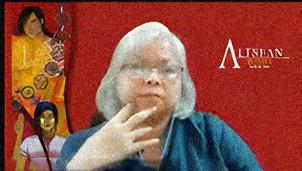

Stothard made the somber reminder at the soft launch of a joint publication by CALD and the Women and
Gender Institute (WAGI) of Miriam College on 26 March. The launch, conducted on Zoom, was held on the sidelines of the 6th National Women’s Summit of the Philippines.
Entitled “Regionalism From Above, Regionalism From Below: The ASEAN And Possibilities For A Transformative Regionalism,” the study highlights the importance of a people-centered approach to regionalism through the engagement of the business sector, think tanks, and civil society for the realization of the ASEAN community.
Written by Dr. Lorna Israel and Professor Jonalyn Villasante, the study’s title is based on two types of regionalism in Southeast Asia: from above, or one that is basically led by the state; and from below, or one spearheaded by non-state actors. To further advance regionalism, the study recommends institutionalizing the participation of non-state actors in the ASEAN decision-making process, as well as continuing the work of civil-society organizations outside ASEAN-sanctioned spaces in a peaceful and diplomatic way.


In the 2022 election cycle in the Philippines, the majority of the registered voters were youths.
University of the Philippines political science professor Dr. Aries Arugay said that an ongoing study showed that 74 percent of the registered youth intended to vote on 9 May—way above national-election turnouts in recent memory. Whether or not the youth would vote in unison for one candidate, however, was another story. As participants and speakers in an online roundtable discussion organized by CALD and the Center for Liberalism and Democracy pointed out, socioeconomic status, educational attainment, and preferred sources of information might have greater impacts on electoral decisions than age.
Entitled “Juan Call, Juan Voice: What Kind of Leader Do We Need?”, the roundtable discussion held on 29 April was part of the “Juan Vote: Get Out and Vote” campaign. It aimed to help increase the voter turnout for the Philippine 2022 elections by educating Filipino youths on the basic values of democracy and civic duty transcending to responsible voting. Project Manager Lakan Uhay Alegre said in opening the event, “All of the organizers and volunteers are part of the youth sector. We believe that this election is important.”
Binibining Pilipinas 2021 2nd Runner-Up Meiji Cruz would later emphasize how the 2022 election cycle had encouraged and mobilized the youth to actually go out and advocate for the kind of leadership that they want, and fight




Former Thai Foreign Affairs Minister Kasit Piromya, in his reaction, expressed his agreement with the study’s recommendations. He also said that ASEAN, as a community, must choose whether it wants to side with democracies or with autocracies. If ASEAN member-states continue to lean toward autocracy or authoritarianism, Khun Kasit said, “it would be very difficult for all of the leaders to be able to sit down or work with civil society to pursue the dreams of ASEAN regional organization as a whole.”
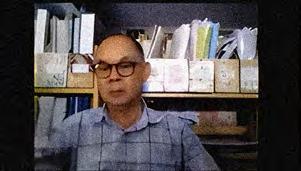
Conscious of the political realities in ASEAN today, Stothard observed that “while there is room for civil society and non-state actors to engage with ASEAN in a constructive way, one of the experiences that I notice is that the way to get change sometimes is to actually be disruptive and provocative.”
ASEAN was turning 55 in August 2022. Perhaps it is time that it sheds old ways and considers people before protocols first.


against disinformation both online and offline. Dr. Frederick Rey of the Sociology and Political Science Departments of the University of Sto. Tomas in Manila noted, however, that while people may identify their wants in a leader, it is also crucial to look at the other dimension of voting, or the kind of voters with the power to elect the right candidates. Or as Arugay put it, “The vote on May 9th should be about which government has a plan, which candidate has a track record of being present and a track record of being responsive. Because without it, voting will just be about a cult following.”
The problem with the 2022 Philippine elections, though, was that troll armies had taken over conversations and discussions, and had muddled issues altogeth-


er. Rey commented, “Producing the truth is important, especially in combating disinformation.”
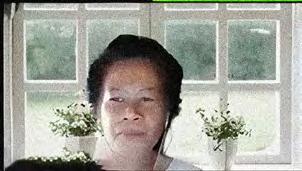
The roundtable discussion actually covered a spectrum of issues, including healthcare, access to quality education, dis/misinformation, corruption, and inequality. A major concern was on how to discern which candidates would address not only the wants of a particular sector but also the needs of the general society.
GoodGov PH’s Dexter Yang, however, reminded the forum participants that while voting is a major component of political participation, it should not be limited to it. He shared how their organization has been one of the frontliners in educating the youth on how to participate especially in local
governance through the mandates of the Sangguniang Kabataan Act. Through Yang’s leadership, San Pablo City, in the Philippine province of Laguna, has been a model of how to maximize Local Youth Development Councils to craft and implement a progressive and responsive local youth agenda.

Still, the panelists agreed that the surge in volunteerism during the campaign was a healthy indication of people’s interest in a truly participatory government. The challenge, said Arugay, was how to harness this potential after the elections, regardless who wins. But he also said, “I think what we all want is a leadership that inspires to the point that it’s able to release the best version of the Filipino.”

A corrupt and iron-fisted government can shatter the hopes of citizens, but a new election report indicates that Cambodia’s youths are not about to give up just yet. Even Mardi Seng, Treasurer of the Candle Light Party, currently the main opposition party in Cambodia, was moved to comment, “It’s very interesting to find that people, especially young people, are actually looking forward to participate in this democratic process through the election.”
The report, “Cambodian Commune and National Elections: Insights and Lessons,” was done by the independent political think tank Future Forum for CALD. It was launched via Zoom on 2 June, just in time for Cambodia’s 5 June commune elections. At the event, CALD Executive Director Celito Arlegue explained that the Council wanted an analysis of the issues and concerns in Cambodia. It also wanted to know the perspectives and sentiments of Cambodian voters, who are predominantly young. Cambodia, after all, has the fourth largest youth population in Southeast Asia. According to the UN Development Programme, 65 percent of the country’s 16.8 million people are under the age of 30.
The 5 June elections were being seen as a litmus test for both the ruling party and the disbanded
Cambodia National Rescue Party, which had fractured into several smaller parties that were competing in 2022 commune polls. (These political parties are also featured in the report.)
Experts have said that Cambodia’s 2022 electoral process was an improvement over the 2018 elections. The participation and relatively strong presence of the Candle Light Party in the lead-up to the polls, for instance, was perceived as a positive development. At the time of the report’s launch, it was still unclear if the upcoming elections would meet the minimum standards for free and fair polls set out by the Committee for Free and Fair Elections (COMFREL). Overall, however, the view was that the outcome would serve as a “baseline” of voting behavior for the National Elections in 2023.
Discussing some of the findings of the report, Kathrin Reed of Future Forum said that “several priorities (were identified) for national policy in the upcoming elections. These include COVID-19 response, job creation, social protection for the poor and elderly, youth employment, improving access to public services and agricultural markets, strengthening law enforcement, promoting technology, eradicating
corruption, as well as fostering social justice. ”
“Voters are looking at what matters to them in their day-to-day (lives),” said Future Forum Research Director Michael Renfew. “It’s not just party politics/personality politics, but rather how elections… can support and sustain development.”

By laying out the current challenges and opportunities within Cambodia’s 2022 election cycle, with a particular focus on the views of young, educated voters, the report would no doubt be useful for political, academic, and civil-society stakeholders interested in knowing how young people view national and local issues. Vanessa Steinmetz, FNF Regional Project Coordinator said in her closing remarks at the launch that “to hear about the hopes of the youth in Cambodia, and to also hear about how [the political opposition] is fighting to expand democracy spaces and possibly open the door for a brighter future, is really inspiring.”
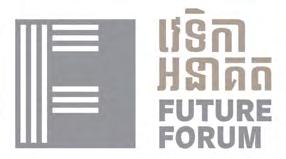



As of 1 June, there were already 4,169 verified deaths of civilians in Ukraine because of the Russian invasion; over 3.6 million refugees, meanwhile, had fled to Poland, Romania, Hungary, and even Russia because of the fighting. The price of oil, along with food, transportation, and other basic needs were skyrocketing. According to the Organisation for Economic Co-operation and Development (OECD), the world economy will pay a “hefty price” for the Russia-Ukraine war, including weaker growth, steeper inflation, and potentially long-lasting damage to supply chains.
The impact of the Russia-Ukraine war shows how a clear and blatant attack on the sovereignty of another nation affects not only the countries directly involved, but also the rest of the world. In Asia, the war is also being seen as having parallels to what China has been doing in the West Philippine Sea.
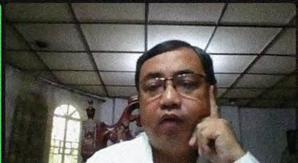
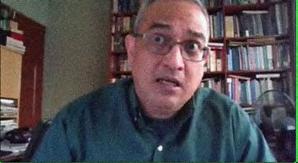
As a response to these conflicts, the Center for Liberalism and Democracy, together with FNF Philippines, conducted the regional forum “Ukraine vs. Russia: Its Impact on the Region’s Political Economic Order” on 18 August via Zoom. Anchored on the idea of how Southeast Asian nations can protect themselves from the ongoing war, the discussions also covered the ASEAN Outlook on the Indo-Pacific to contextualize the issue.
Among the forum panelists were academicians, politicians, and a journalist. Early on, Taiwanese legislator Chih-Cheng Lo highlighted deterrence as being “more important than defense when war breaks out.”
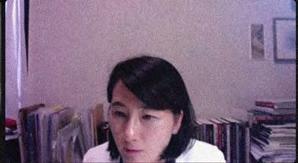

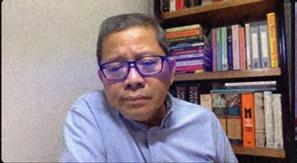
“To make sure we have an effective deterrence, there are two important components,” he said. “The first is credibility. Credibility means that we have to show that regional countries, especially democracies, will stand together. The second is capability. We have to build up our credible deterrence strategy.”
Also enriching the discussion were University of the Philippines Political Science Department Chairperson Herman Joseph S. Kraft, Tsukuba University professor Dr. Aki Sakabe-Mori, and International Studies Professor Sherlyn Mae F. Hernandez of De La Salle University-Manila. All three agreed that parallels could be drawn from the Ukraine vs. Russia war and the West Philippine Sea dispute, and that both should be perceived more as blatant attacks on sovereignty rather than attacks on democracy.
Among the other ideas that emerged during the discussions was, one arguing that instead of simply looking at both situations from political and economic standpoints, they should be perceived primarily as human-rights issues where the lives of citizens are at risk. And since the Russia-Ukraine war

and the West Philippine Sea dispute are clear cases of the violation of freedom but not so much of democracy, a country’s non-democratic political structure may not necessarily mean it should be seen as supporting the Russian invasion.
One good example is Japan, which remains in support of the victims of the war while tiptoeing through other issues brought up by the war. SakabeMori noted, “Japan stands with Ukraine and aligns fully with United States and the G7, Australia, and other countries with shared common values, while it is carefully refraining from the framing of democracy versus autocracy in this ongoing war.”
As for the ASEAN Outlook on the Indo-Pacific, Professor Kraft pointed out how it seems to play safe on declaring support and/or condoning a country.
Kraft said that in his opinion, ASEAN could do better. Seconding his remarks was Professor Hernandez, who also observed that ASEAN seems to be slowpaced in achieving its vision.

Dennis Arroyo, former Director of National Planning and Policy Staff of the Philippines’ National Economic and Development Authority, for his part, said, “The Indo-Pacific framework includes these areas of cooperation: maritime cooperation, productivity, UN sustainable development goals, economic cooperation. There is nothing on peace-building. This should be included. Peace-building should be included in the Indo-Pacific framework.”
Rounding up the discussions was Filipino journalist John Nery, who highlighted the importance to understand the nature of the Russia-Ukraine conflict. He remarked, “The way we define the nature of the war will help determine the means of the solution.”

The phrase “Freedom is not free” is usually attributed to U.S. Air Force Colonel Walter Hitchcock, who was referring to the sacrifices members of the military make in defense of nations. Yet even in countries that are not in wars, people are fighting for freedoms that are supposed to be among their rights. In East and Southeast Asia, for example, the political histories of several countries show that freedoms must be actively fought for, protected, and promoted.
At the 7th Asia Centre International Conference on Freedom of Expression held on 24-26 August in Bangkok, Thailand, CALD organized a panel that focused in particular on rights activists and members of the political opposition in Cambodia, Singapore, and Taiwan who became targets of authorities just because they were vocal about their criticisms of those in power. Moderated by CALD Executive Director Celito Arlegue, the panel was one of 16 in the conference. It attracted around 100 in-person participants, while dozens more joined via Zoom.
The plight of detained Cambodian American lawyer-activist Theary Seng was among those highlighted during the panel. Theary Seng was recently convicted of “conspiracy to commit treason” and “incitement to create gross chaos impacting public security.” Her conviction came after a sham trial where the factual bases of the charges against her were not even presented. Her case also reflects the plight of the dominant political opposition, whose leaders are “in exile, in prison, or waiting to go to prison.”
The Online Citizen (TOC) publisher and editor Terry Xu meanwhile recounted his multiple run-ins with the Singaporean government over some content posted on his online media platform. In 2019, Xu was sued by Prime Minister Lee Hsien Loong for defamation for an article on the Singaporean leader’s family. More recently, Xu was imprisoned over TOC’s publication of a 2018 letter that was alleged to have criminally defamed the Singaporean Cabinet. Xu is now in self-imposed exile in Taiwan to escape political persecution in his home country.
Pei-fen Hsieh, spokesperson of the Democratic Progressive Party, ended the panel by presenting Taiwan’s long and arduous journey to achieve the freedoms that it is enjoying today, including freedom of expression. “Freedom is never free,” Hsieh said. This also served as an apt reminder to the other participants not to be complacent when it comes to safeguarding democracy, human rights, and fundamental freedoms.
It was a global gathering of democrats like no other, and CALD was proud to be part of it.

With the theme, “Claiming the Democratic Future: Unifying Voices for a New Frontier,” the 11th Global Assembly of the World Movement for Democracy (WMD) saw over 200 rights activists, experts, parliamentarians, and donors from all regions of the world in attendance. Held in Taipei, Taiwan on 25-27 October, the event aimed to foster greater unity of efforts to address authoritarian challenges and build democratic momentum.
The Assembly had participants engaging in a wide range of practical workshops and panel discussions, and sharing expertise in building resilient democratic institutions and defending civic space. One of the panel discussions was entitled, “Unite for Democracy: Cross-Party Collaboration: A Game-Changer?” Organized by the National Democratic Institute for International Affairs (NDI) and moderated by its
political parties director, Birgitta Ohlsson, the panel looked into the potentials of cross-party collaboration as a way to unite democracies worldwide and push back on democratic backsliding.
CALD Executive Director Celito Arlegue represented the Council in the panel, which also featured Brunco Goncalves, secretary general of International Union of Socialist Youth, and Da-chi Liao, vice president of the Taiwan Foundation for Democracy. In introducing the panel, Ohlsson emphasized the challenge posed by authoritarian rule—now the dominant global model—on democracy, and what democrats can do about it.
“The challenge to democracy has been going on for years, but for us in CALD, the turning point was the year 2016,” said Arlegue, who was part of the two-man CALD delegation that included Lorenzo ‘Erin’ Tanada, vice president of the Liberal Party of the Philippines. “The electoral victory of Rodrigo
Duterte in the Philippines, Brexit, and the rise of Donald Trump turned 2016 into an annus horribilis, and served as a wake-up call for us in CALD that we cannot just continue doing what we do. We have to do more.”
Drawing from CALD’s experience, Arlegue came up with three suggestions on how political parties can be a game-changer in this global battle between democracy and authoritarianism: 1) Parties must find ways to incorporate young people within their party structures; 2) They must also recognize that local issues—not ideological or geostrategic considerations— matter most for the people, and 3) They must walk the talk and practice what they preach.
“We are in the last two minutes in the fight to keep democracy alive,” said Nobel Peace Laureate and Rappler CEO Maria Ressa in her address at the Assembly. Judging from the response of the participants, it seemed that they, too, believed democrats need to act swiftly and decisively.
It has been more than a decade since the United Nations’ Human Rights Council endorsed the “Guiding Principles on Business and Human Rights.” Yet the knowledge of parliamentarians and political party leaders on this issue remains rather rudimentary compared to that of rights activists, lawyers, and business leaders.

And so in November, the Asia Centre, in cooperation with FNF, organized a regional training workshop on business and human rights primarily for parliamentarians and political party leaders in Asia. Participants in the two-day workshop (28-30 November) held in Bangkok, Thailand included representatives of CALD member-parties from Thailand, Taiwan, Philippines, Singapore, Cambodia, Indonesia, and Mongolia. Acting as facilitators were Asia Centre Regional Director James Gomez, Access Now Asia-Pacific Campaigner Golda Benjamin, and M. Ravi Law founder M. Ravi.
The workshop had also been inspired by the chapter contributed by CALD to the Asia Centre and FNF publication Business and Human Rights in Southeast Asia: Developing National Action Plans. In the chapter, which focuses on the development of BHR National Action Plans (NAPs), CALD observes that “the engagement of parliamentarians in developing the NAP was noticeably absent… despite the consensus that parliamentarians can contribute, in a number of ways, to the process of drafting and implementing the NAP.” In other words, much more needs to be done to democratize the NAP process and internalize BHR principles.


“Our fight to advance Business and Human Rights—like our broader struggle to embed democracy and liberal democratic values in Asian society—is still a work-inprogress,” said CALD Secretary General Francis Gerald ‘Blue’ Abaya at the Bangkok workshop. He expressed his hope that the training could provide some guideposts on how to advance BHR in the participants’ respective countries. “After all,” he said, “human rights are an issue that should concern us all.”
One area where parliamentarians and political party leaders can push for BHR is in the development of the NAPs. In the panel he moderated, CALD Executive Director Lito Arlegue provided an overview of the NAPs process in each country, as well as the openings where political actors can intervene. Participants tackled these issues more substantively in the group discussions that followed, and then reported the results of their discussions to the plenary.
The workshop also provided the participants an opportunity to explore the “alphabet soup of acronyms” that accompany BHR , such as Environmental, Social and Governance (ESG), Corporate Social Responsibility (CSR), Human Rights Due Diligence (HRDD), Strategic Lawsuit Against Public Participation (SLAPP), among others. There were discussions as well on the role of design professionals and religious organizations in advancing human rights at the country, community, and workplace levels.
The Income Guarantee Scheme for Thai farmers is an important policy of the Democrat Party. It was one condition that the Party considered crucial before it made the decision to join the current government. This policy has been in implementation for the last three years (2020-2022). The scheme covers five categories of farm products: rice, palm oil, rubber, tapioca, and maize—crops that drive Thailand’s economy.

Cultivation is risky as it means dealing with a lot of uncertainties. As a result, farmers—who make up one-third of the Thai labor force—have often faced losses. The government then sought ways to help alleviate their suffering. The Income Guarantee Scheme oversees
farmers and provincial households covering the entire country. In hard figures, this translates into about 7.92 million households with an average of four members each, which means the scheme covers an estimated 31.68 million people.
The scheme’s principle, however, is such that it is also one of the channels for injecting money into the economy. The government compensates farmers, which then causes money to circulate and benefit many others. When the farmers spend, shops, markets, and communities get revenues that stimulate the economy and lead to GDP expansion.

During the three years that the Income Guarantee Scheme has
been in effect, it has injected some THB 450,000 to 500,000 million into the economy. Not surprisingly, there have been no farmer mobs calling for the government to fix prices on agricultural products. To help keep the scheme corruption-free, a rigorous vetting process involving all parties has been in place. Compensation for eligible farmers also go directly into their accounts with the Bank for Agriculture and Agricultural Cooperatives, where farmers register and open accounts.
DP plans to move next toward high-value agriculture with technology and innovation. Bio-economy will be the driving force that will increase Thai farmers’ incomes some more.
DEMOCRATIC PROGRESSIVE PARTY
For more than two years now, the COVID-19 pandemic has been deeply affecting the whole world. Thanks to the cooperation from Taiwanese people and solidarity in looking out for one another, Taiwan’s pandemic prevention efforts have earned global recognition in comparison with many other countries.
Taiwan already holds a key position in the fields of semiconductors and information and communications technology hardware and software. We must quickly catch up in other fields to ensure our strong footing.

More importantly, we believe building democratic resilience is key to safeguarding Taiwan. Our primary task in this regard is to make our commitment to a free and democratic system an unbreakable national consensus. We should unanimously and resolutely stand behind our free and democratic system, no matter how much external pressure we face.
Going forward, we will continue to strengthen fact-checking mechanisms targeting disinformation, enhance the transparency and accessibility of information, and help our people more effectively distinguish fact from fiction to neutralize the threat of information warfare.
The other part of this work is to continue deepening Taiwan’s international cooperation and close ties with democratic allies. As the expansion of
authoritarianism has gradually come to threaten the global order, friends from across the world have traveled to Taiwan to express their heartwarming support. In fact, Taiwan is now receiving more international attention than ever before.
Taiwan has become an important global symbol of democracy and freedom. The international community fully understands that upholding Taiwan’s security means upholding regional stability and democratic values. The destruction of Taiwan’s democracy and freedom would be a grave defeat for the world’s democracies.
Our democracy is not just about defining Taiwan’s international role for the rest of the world; it is our core strategy for strengthening Taiwan’s social resilience.
It turned 76 in 2022, and so the Liberal Party of the Philippines kicked off the year with a major celebration. For its 76th anniversary, LP chose the theme “Kaya Liberal”— a play on the Tagalog word “kaya” that can mean “that’s why” and also “we can”—which signaled the party’s shift to the mobilization of its members for the local and national elections that May. With over 11,000 non-political members, the party supported the candidacy for national posts of key Liberal personalities such as Maria Leonor ‘Leni’ Robredo for president, Francis ‘Kiko’ Pangilinan for vice president, Teodoro ‘Teddy’ Brawner Baguilat Jr. for senator, and Leila de Lima for senator.
To forward liberalism and democracy, LP collaborated with the Center for Liberalism and Democracy on three workshops and conferences:
• Cadiz Workshop—A visioning and brand development workshop for Liberal Party leaders of Capiz;
• Sustainable Tomorrow: Transitioning to a Greener Future; and

• Building Cities Smarter, Fairer, Greener.
All three events included talks that spanned from climate action to strengthening liberalism amid modern challenges.
With renewed strength and optimism, the Party elected its new set of officers with Albay 1st District Representative Edcel Lagman taking the LP helm on 30 September.
The Cambodian courts conducted mass trials of leaders and local members of the opposition Cambodia National Rescue Party throughout 2022. Eight top CNRP leaders who faced various accusations received life prison sentences. Eight members of the CNRP Permanent Committee received up to 40 years of prison sentence each. More than 40 local members received five to seven years each.
“The outcome of this first instance trial reinforces a troubling pattern of political trials peppered with judicial flaws,” UN human-rights experts said in a 29 June press release. “We urge the government to urgently review and remedy the process to ensure the defendants’ access to justice.”
The experts said that the concerns around the legal process include:
• Several accused being denied physical access to their trial and consequently tried in absentia;
• Denial of complete access to case files;
• The violation of the principle of presumption of innocence is noted in examples of judges’ use of accusatory language against defendants present at hearings;
• Extended periods of pre-trial detention in contravention of national and international laws protecting the right to a timely trial; and
• The lack of precise, factual, and conclusive evidence underpinning the charges.
The press report was released by the UN Office of the High Commissioner of Human Rights. The experts urged the Cambodian government “to review these convictions—and all pending similar cases—and to ensure future judicial proceedings adhere to international obligations.”
“This is critical to ensure the trend of shrinking civic and democratic space in Cambodia, aggravated by these trials, is reversed,” they also said. “A hindered access to justice not only infringes the rights of the victims, but has an overall chilling effect on society, discourages participation in assemblies and associations, and contributes to the dangerous trend of closing of civic space.”
CNRP President Kem Sokha continues to face courts that have failed to produce any evidence for his conviction.
CNRP leaders in exile continue to mobilize support from members of the European Parliament.
In May, the European Parliament adopted a resolution on the continuous crackdown of political opposition in Cambodia. The resolution’s main points include:
• Expresses its deep concern over the backsliding on human rights in Cambodia in light of the upcoming local elections in June 2022 and national elections in 2023, including the restrictions on independent reporting, the criminalization of free speech, and the de facto ban. Calls for the EU, the Member States, and the international community, in light of Cambodia’s role as chair of the Association of Southeast Asian Nations (ASEAN), to seize the opportunity to apply pres-

sure and take public actions to provide protection for activists and human rights defenders and to support political parties in their struggle to reopen some amount of political and civic space in anticipation of the upcoming communal elections on 5 June 2022 and national elections in 2023;
• Reiterates its call for targeted sanctions and urges the Council to adopt restrictive measures, including travel bans and asset freezes, against political leaders and leaders of the security forces, as well as their economic interests, under the EU Global Human Rights Sanctions Regime with a view to holding to account all persons responsible for serious human rights violations and the dissolution and subsequent repression of the opposition in Cambodia;
• Calls on the Commission to monitor the upcoming local elections very closely and to be prepared to use all tools available, including a complete suspension of Cambodia’s EBA status and other sanctions, should the electoral observers find evidence of unfair elections;
• Urges the Commission to insist on clearly defined human rights benchmarks in all its interactions with the Cambodian Government and to include the issues of concern highlighted in this resolution, including Cambodia’s EBA status, as part of its ongoing enhanced engagement with the Cambodian authorities; calls on the Commission to closely monitor the situation and assess the effect of the partial EBA suspension on the most vulnerable segments of civil society;
• Calls on the Commission to monitor all bilateral financial support to the Cambodian Government and ensure that bilateral financial support goes to Cambodian civil society organizations and opposition parties; and
• Instructs its President to forward this resolution to the Council, the Commission, the Vice President of the Commission/ High Representative of the Union for Foreign Affairs and Security Policy, the Secretary General of ASEAN and the Government, Prime Minister and National Assembly of Cambodia.

Meanwhile, in the United States, CNRP North America mobilized Cambodian Americans to urge their elected representatives in the U.S. Congress to support and adopt the Cambodia Democracy and Human Rights Act of 2022, which would require the President to impose sanctions on foreign persons he determines have undermined democracy in Cambodia, violated human rights, engaged in corruption, or supported the development of facilities in Cambodia that could be used by the Chinese military.
In September, CNRP held a three-day strategic planning event that gathered over 50 leaders at Watt Phnom Serei in Massachusetts. The discussions focused on the way forward and in having free, fair, and just elections in Cambodia.
CNRP is committed to work with all Cambodian Democrats and partners inside and outside Cambodia to return the country to the democratic path.
CNRP has extended its collaboration with the Myanmar diaspora and the Hong Kong groups outside to form strong alliances to fight autocracy.
Before 2022 came to a close, Mongolia saw a peaceful protest movement unfold and become the second largest yet in the country. The demonstrations, which began on 5 December, took place despite freezing temperatures that at some points reached -30 degrees Celsius.
Dubbed the “Anti-Coal Theft Protest,” the sudden mass demonstrations were made up mostly of the youth who wanted government action on the alleged theft of billions of dollars worth of coal from a stateowned company. At least 30 lawmakers were supposed to have been involved in the scandal.
Mongolia’s problems, however, go beyond coal theft. The protests reflected the social dissatisfaction that has been exhausting Mongolian youth. After years of injustice, inequality, and inefficiency, the government—and specifically the Ministry of Justice—now has to answer to the public. In fact, as the protests continued, people of all ages began to join the relatively young demonstrators at Ulaanbaatar’s Sukhbaatar Square. While many of them came to show support for the youthful protesters, they also brought up their own issues and complaints. Air pollution, high taxes, lack of job opportunities, missing coal, missing opportunities, corruption, and inequality were among the many concerns being voiced.
Artists and social influencers used social media tools to call for people to join the rally. On the whole, there was a sense of unity among those in the square. Some artists known to be supporters of President Khurelsukh Ukhnaa were promoting a peaceful presence, seeking to prevent a possible escalation that could turn the demonstrations violent. Local small businesses and well-known activists brought warm food and tea for the protesters. Mon-

golians abroad meanwhile began GoFundMe accounts in favor of the protesters.
Yet in the midst of the thousands of protesters who joined the rally in good faith, there were those holding cash and offering bribes to the demonstrators. During the “Discussion with Journalists” TV program on 10 December, a female protester said, “We sat in the front, on the cold cement. We had children coming from the back area and [they] informed us about people carrying cash to bribe the protestors.” Hearing this, Justice Minister Nyambaatar Khishgee stated, “The department will look into this.”
In response to the public outcry, the Mongolian cabinet passed an emergency resolution to declassify nine projects implemented by Erdenes Tavan Tolgoi (ETT), the mining company at the center of the original allegations of coal industry corruption. Among the declassified information were those on the Tavan Tolgoi-Gashuunsukhait and Tavan Tolgoi-Zuunbayan railroad project, its financial transactions, and certain contractual agreements and amendments made in 2019.
Several former ETT executives were arrested. The declassified information involving the railroad quickly turned into a political issue, as it involves former President Battulga Khaltmaa, who served as minister of roads, transportation, construction, and urban development during the time in question. But the government needs to abstain from politicizing the issue and tackle the details of who committed theft and how. Following the public’s demand to release the names of alleged coal thieves, Nyambaatar said in a meeting with journalists: “I do not have the legal rights to release the medium and high-level ‘thieves’ by their names. My job and principle are to strengthen the legal, and justice system of Mongolia, however, you disrespect and come at me.”
On a number of social media platforms, people shared unverified stories of corruption in the coal and mining industries, many involving mining con-
glomerate families. Some posts even referred back to the 2016 Panama Papers, which involved former Prime Minister Batbold Sukhbaatar’s offshore accounts. Batbold still serves as a member of parliament.
The overall frustration and anger of the Mongolian people are understandable. Since the mining boom in 2011, inequality between the rich and the working class has grown ever wider, whether viewed in terms of the income gap or overall purchasing power. In assessing Mongolia’s current economic and corruption climate, however, the dilemma is that the mining conglomerates play a major role in decision-making and contribute tremendously to the national economy at large.
The obvious unfortunate part of this dynamic is that the rich get richer while the poor get poorer. This six-day demonstration stemmed from this larger problem: The Mongolian people have had it and they want equality. By taking to the streets they are saying, ‘Enough is enough; no more bending backwards and no more special treatment for the coal thieves.’ In an interview with the Zuv.mn on Facebook Live, a young female protester spoke for many when she said that the current government’s actions will not be enough. Catching a thief or two is not a real solution to Mongolia’s corruption. The protester further asked why she and her fellow colleagues are struggling to live in today’s Mongolia despite her high education and foreign-language skills. Why, she asked, must she live a restless life, working three jobs, while others are stealing millions and continue to flourish in the current political and business system?
The people of Mongolia want the Oyun-Erdene administration to unveil the corrupt system that has protected these mining conglomerates, particularly state-owned enterprises such as Erdenes Tavan Tolgoi. The people of Mongolia do not want to hear political rhetoric or narratives. They want crystal-clear action from the Ministry of Justice and from the Office of the Prime Minister.
CALD SMART CITY PROJECT
“Towards Reimagining Smart City Plans and Strengthening Partnerships”
Cheng Wen-tsan Mayor of Taoyuan City, Taiwan
Francis “Blue” Abaya Member of Parliament, Liberal Party of the Philippines Secretary General, Council of Asian Liberals and Democrats
Ipuk Fiestiandani Regent of Banyuwangi, Indonesia
Ira Cruz Director, AltMobility PH
Lito Arlegue
Executive Director, Council of Asian Liberals and Democrats
Moritz Kleine-Brockhoff Head of FNF Southeast and East Asia, Friedrich Naumann Foundation for Freedom
Paolo Zamora
Program Manager, Council of Asian Liberals and Democrats
Rika Zikriyyah
Head of Communications and Marketing, Jakarta Smart City
Thoriqul Haq M.ML Regrent of Lumajang Indonesia
CALD Smart Mobility Workshop
“Smart Mobility in Asia: Identifying Transformative Opportunities and Challenges”
Anita Chen Deputy Secretary General GO SMART Taiwan
Elli Kan International Division Smart City Taiwan
Erika Fille T. Legara, PhD Aboitiz Chair in Data Science Asian Institute of Management
Francis “Blue” Abaya Member of Parliament, Liberal Party of the Philippines
Secretary General, Council of Asian Liberals and Democrats
Jin Young Park, PhD Korea Transport Institute
Karlo Abadines Officer, AltMobility PH
Ira Cruz
Director, AltMobility PH
Lito Arlegue Executive Director Council of Asian Liberals and Democrats
Paolo Zamora Program Manager Council of Asian Liberals and Democrats
Rika Zikriyyah
Head of Communications and Marketing
Jakarta Smart City
Robert “Robie” Siy Jr., PhD Convenor, Move as One Coalition
Romtham Khumnurak Co-founder, Environman Thailand
Segundo Joaquin Romero, Jr., PhD Lecturer, Development Studies Program Ateneo de Manila University
Vanessa Steinmetz Regional Project Coordinator
Friedrich Naumann Foundation for Freedom

Yos Sunitiyoso Vice President of Research, Development, and Training Intelligent Transport System (ITS) Indonesia
9th ALDE-CALD Meeting, 45th CALD Executive Committee Meeting & CALD Germany Executive Mission
Alassane Ouattara President, Ivory Coast
Amanda Kanange President, IFLRY
Annemie NeytsUyttebroeck
President of Honour, Liberal International
Annett Witte
Head of Department, Friedrich Naumann Foundation
Astrid Thors
Vice President, Liberal International Chair, Liberal International Human Rights Committee
Birgitta Ohlsson
Director of Political Parties, National Democratic Institute
Charles du Vinage
Head of Asia Desk, FNF Potsdam
Daniel Kaddik
Executive Director, European Liberal Forum
Felix Heiduk
Head of Asia, Research Division, SWP

Frank Müller-Rosentritt
ASEAN Parliamentary Group, Bundestag
Hakima el Haité
President, Liberal International
Ilhan Kyuchyuk
Acting Co-President ALDE Party
Timmy Dooley
Acting Co-President ALDE Party
Irene Wang Programme Officer, Liberal International Human Rights Committee
Iskra Mihaylova
Vice President, Renew Europe, Bulgaria
Jason Frazer
Head of Communications, Liberal International
Johanna Borsch-Supan
Federal Ministry for Education and Research
Judith Pallares Treasurer, Liberal International
Juli Minoves
Former President, Liberal International
Karl-Heinz Paqué Deputy President, Liberal International
Lord Alderdice President of Honour, Liberal International
Lorenzo “Erin” Tanada III Vice President for External Affairs
Liberal Party, Philippines
Macky Sall President of Senegal Chairman of the African Union
Manfred R Eisenbach Secretary General, German Group of Liberal International
Markus Löning
Managing Director, Löning
Mario Brandenburg
Federal Ministry for Education and Research
Martin Chungong Secretary General, InterParliamentary Union
Moritz-Kleine Brockhoff
Regional Director
Friedrich Naumann Foundation
Southeast and East Asia
Mustafa Karadayi Chairman, MRF
Petre Roman
Former Prime Minister of Romania President, UMEF University
Rachada Dhnadirek Deputy Government Spokesperson, Thailand
Robert Woodthorpe Browne Vice President, Liberal International
Rik Daems Chairman, Parliamentary Network on Healthy Environment, Parliamentary Assembly of the Council of Europe
Ryota Jonen Director, World Movement for Democracy
Steven Linares Climate Justice Committee Chair, Liberal International
Susanna Bergman Deputy Chairman, Climate Justice Committee, Liberal International
Tsai, Ing-wen President of Taiwan
Umaro Embaló President of Guinea Bissau
William Townsend Secretary General, Liberal International
Yair Lapid
Minister of Foreign Affairs, Israel
Writeshop “Smart Mobility in Asia: Emerging Trends, Opportunities and Challenges”
Celito Arlegue Executive Director Council of Asian Liberals and Democrats
Ellie Kan Sales Manager International Division of Institute for Information Industry, Smart City Taiwan
Francis “Blue” Abaya Secretary General, Council of Asian Liberals and Democrats
Francis “Kiko” Pangilinan Chairperson, Council of Asian Liberals and Democrats President, Liberal Party of the Philippines
Ira Cruz Director, AltMobility PH
Jason R. Gonzales Director General, Liberal Party of the Philippines Board Member, Iloilo Provincial Government
Karlo Abadines AltMobility PH
Kiat Sittheeamorn Member of Parliament Chairman of Foreign Affairs Committee
Democrat Party Thailand
Mochamad Nur Arifin Mayor of Trenggalek, Indonesia Indonesian Democratic Party of Struggle
Mohammad Yusuf Wuisan Member, Foreign Affairs Department Indonesian Democratic Party of Struggle
Paolo Zamora Program Manager
Council of Asian Liberals and Democrats
Pinit Kanchanachusak Member, Bangkok Metropolitan Council Member, Democrat Party Thailand
Romtham Khumnurak Co-Founder of Environman Democrat Party Thailand
Sunutcha Losathapornpipit Member of Parliament, Trang Province Democrat Party Thailand
Vanessa Steinmetz Regional Project Coordinator for Southeast and East Asia
Friedrich Naumann Foundation for Freedom



14th CALD General Assembly & 46th CALD Executive Committee Meeting
Ali Sangalang Co-founder, Linya-Linya
Ana Theresia “Risa” Hontiveros-Baraquel Senator, Republic of the Philippines
Antonio Carpio Former Associate Justice Supreme Court of the Philippines
Arthur Defensor, Jr. Governor, Province of Iloilo Chompoonute “Cherie” Nakornthap Secretary, Foreign Affairs Committee House of Representatives of Thailand
Cleve V. Arguelles Assistant Professorial Lecturer De La Salle University Manila
Edcel Lagman, MP Member, Philippine House of Representatives President, Liberal Party of the Philippines
Edwin Lacierda Former Spokesperson Office of Philippine President Noynoy Aquino
Ellen Tordesillas President, Vera Files
Florencio “Butch” Abad Former Philippine Secretary (Minister) of Budget and Management Former Chairperson, Council of Asian Liberals and Democrats
Floyd Scott Tiogangco Public Relations Manager DAKILA
Francis “Kiko” Pangilinan Chairperson, Council of Asian Liberals and Democrats Chairperson, Liberal Party of the Philippines
Francis Gerald “Blue” Abaya Secretary General, Council of Asian Liberals and Democrats Former Member of Philippine Congress, 1st district of Cavite
Francisco Jayme Guiang Assistant Professor, Department of History University of the Philippines Diliman
Franklin Drilon Former Senate President of the Philippines Former Chairperson, Council of Asian Liberals and Democrats
Ibarra “Barry” M. Gutierrez III Former Spokesperson Office of Philippine Vice President Leni Robredo
Isabel Pefianco-Martin (video) Chair, Department of Educational Management and Leadership (EML), Gokongwei Brothers School of Education and Learning Design, Ateneo de Manila University
James Gomez Regional Director, Asia Centre
Jaslyn Go Cadre Member, Singapore Democratic Party

Jason R. Gonzales Director General, Liberal Party of the Philippines Board Member, Iloilo Provincial Government
Jayanthi Devi Balaguru Chairperson, CALD Women’s Caucus
Jeremiah Tomas Secretary General, CALD Youth
Jerry P. Trenas Mayor, Iloilo City
John Joseph Coronel President Center for Liberalism and Democracy
Jose Christopher “Kit” Belmonte Vice Chairperson, Liberal Party of the Philippines Former Member of Philippine Congress, 6th district of Quezon City
John Nery Columnist and Editorial Consultant, Rappler
Joi Marie Angelica “Smile” Indias Chair, Fine Arts Department Ateneo de Manila University
Lorenzo “Erin” Tanada Executive Vice President, Liberal Party of the Philippines Former Deputy Speaker, Philippine Congress
Karry Sison Managing Trustee Center for Liberalism and Democracy
Kulachada Chaipipat COFACT Thailand
Macky Blanco
Former Head of Policy Unit Office of Philippine Vice President Leni
Marian Pastor Roces Art Critic and Curator, TAO INC
Marites Vitug Journalist and Author Editor-at-large, Rappler
Mikael ‘Kael” De Lara Co Poet and Translator Former Deputy Director General for Communications, Liberal Party of the Philippines
Phil Bennion Vice President, Liberal International
Raphael Martin “Raffy” Magno Executive Director, Angat Buhay
Ricky Carandang Journalist and Former Secretary, Presidential Communications Development and Strategic Planning Office
Sheila Coronel (online) Director, Toni Stabile Center for Investigative Journalism Columbia University
Siripa Nan Intavichein Chairperson, CALD Youth
Sir Graham Watson (online) Former President, Alliance of Liberals and Democrats for Europe Party
Teddy Baguilat Secretary General, Liberal Party of the Philippines Former Member of Philippine House of Representatives
Yvonne T. Chua Associate Professor, Department of Journalism University of the Philippines
Contact
67 Setsiri Road, Samsannai Phayathai, Bangkok 10400, Thailand
T +66 2 0 2270 0036

F +66 2 0 2279 6086 public@democrat.or.th www.democrat.or.th
The Democrat Party, founded in 1946, is the longest-standing political party in Thailand, and is one of the longest-standing in Southeast Asia as well. Since its inception over 70 years ago, the Democrat Party has held ideologies that oppose all forms of dictatorship, and is committed to the promotion of democracy for the people, and most importantly, by the people.

The survival and existence of the DP has not come easily. The party had to go through political struggles throughout its history that has five periods:
1st Period (1946-1967)
Party Building, Pro-Democracy and Anti-Dictatorship
2nd Period (1968-1979)
Party Rehabilitation and Democracy Promotion
3rd Period (1979-1990)
Policy Improvement and Participation in National Administration
4th Period (1991-2000)
Leading Party of Opposition and Coalition Government
5th Period (2001-Present)
Combating Parliamentary Dictatorship and opposing the abuse of power and conflicts of interest in public sector
Throughout its history, the DP has always stood firm on the principles of democracy, freedom, transparency, accountability, and public participation. These principles are stipulated in the Party Guidelines, which have helped steer the party through both highs and lows in the last seven decades, and will continue to act as its compass for many years and generations to come.
Under the leadership and guidelines of the Executive Committee, DP aims to provide the Thai public with a viable responsible political alternative to the populist political environment that has been permeating the Thai atmosphere since 2001. Through various
The Democratic Progressive Party of Taiwan was founded on 28 September 1986 by political, social, and human-rights activists, along with defense lawyers of political prisoners. It was then Martial Law, and Taiwan was under the authoritarian regime of the Chinese Nationalist Party (KMT), which had lost the Chinese Civil War.

counties, including four out of six special municipalities. The election was DPP’s best poll showing since its founding. At that time, more than 70 percent of Taiwan’s population resided in a DPP-governing city or county.
schemes and measures implemented since 2008, especially the People’s Agenda, the Party has been able to steer national development toward a new direction. It uses the idea of “policy for the people and by the people,” which highlights the point that “people must come first.”
The Party has assured the inclusiveness of its socio-economic policy and measures. Programs such as 15 years of free education, income-guarantee initiative for farming population, debt relief and access to micro-credits, and social and health security schemes had been launched when the Party was in government.
Leaders
Contact Peifen Hsieh Spokesperson/Deputy Director Department of International Affairs10F, No.30 Beiping E.Rd., Taipei, Taiwan
T +866 2 23929989
F +866 2 23930342
www.dpp.org.tw
F dpptaiwan
Through social and political movements and participation in elections, the founders of DPP risked their freedom and lives to champion a democratic Taiwan. Indeed, DPP played a pivotal role in consolidating Taiwan’s democracy.
In 2000, DPP captured the presidency. From 2000 to 2008, DPP continued to push for freedom of expression, gender equality, social and transitional justice, judicial impartiality, and democracy. DPP also gained valuable experience and lessons as a young party during its eight years of governance.
In 2014, DPP won Taiwan’s local elections by a landslide. DPP took 13 out of the 22 cities and
The year 2016 marked the 30th anniversary of the party’s founding. DPP’s Chairperson, Dr. Tsai Ingwen, and her running mate Dr. Chen Chien-jen garnered 6.89 million votes or 56.1 percent of the total in the presidential election. Dr. Tsai became Taiwan’s first female president.
In 2017, DPP pushed through many reforms and progressive laws, including pension reform, a forward-looking infrastructure plan, transitional-justice acts, and other important policies geared toward a better Taiwan. In 2019, DPP pushed to pass the same-sex marriage bill, making Taiwan the first country in Asia to legalize same-sex marriage.
In 2020, Tsai Ing-wen was reelected as President, and Lai Ching-te was elected as Vice President.
Jurin
Laksanawisit Party Leader Chalermchai Sri-on Secretary General Kiat Sittheamorn Chairperson, Foreign Affairs CommitteeIn 2022, President Tsai stepped down as party chairperson after DPP lost most of the mayor seats in the local election held that November. Vice President Lai Ching-te was elected as chairperson in January 2023.
DPP plans to deepen Taiwan’s democracy further and safeguard the Taiwanese people. Internationally, DPP continues to promote and strengthen the principles of democracy and advocate for human rights and good governance through close alliances with like-minded democracies around the world.
DPP is a founding member of CALD and a member of Liberal International.
Leaders Lai Ching-te Chairperson Hsu Li-ming Secretary GeneralM +65 9674 8633
jufri.salim@yoursdp.org
Singapore Democratic Party 3 Ang Mo Kio Street 62, #02-30, Link@AMK, Singapore, SIngapore
T +65 6456 4531 sdp@yoursdp.org www.yoursdp.org
FIYT yoursdp
The Singapore Democratic Party (SDP) was constituted in 1980. It believes in and is working toward restoring human, civil, and political rights in Singapore; cultivating a transparent and accountable political system based on free competition and equal opportunity for all; removing all policies and practices that discriminate against the less fortunate, women, and minorities, and cooperating with democratic parties and organizations in Asia to achieve peace and sustainable development in the region.
The SDP is widely recognized as the party in Singapore that is most adept in using the Internet to communicate with the public outside of the constraints of the state-controlled media in the city state. It uses blogging, political videos, and social media to reach out to the people. It was the first opposition party in Singapore to have a youth wing (Young Democrats).
The party has released 10 policy papers in the last several years on various topics, including Education, Healthcare, Housing, and Climate Change. The SDP was also the first political party in Singapore to produce a paper on the issues faced by the
The Liberal Party of the Philippines is a founding member of CALD. It is a full member of Liberal International. The LP has championed freedom, justice, and the dignity and rights of the individual for 75 years. At great cost to its stalwarts and members, it stood among the few voices of dissent during the dark days of the Marcos dictatorship, and at every turn in the country’s recent history when democracy came under threat.
minority Malay community with community-driven solutions.
The Central Executive Committee (CEC) leads the party with Prof. Paul Tambyah as Chairman and Dr. Chee Soon Juan as its secretary general. A third of the party leadership are between the age of 30 and 40 years old. Party leaders and members have had to endure a series of court cases, and even imprisonment, for exercising their fundamental rights to freedom of expression and assembly in the recent past.
In the past two general elections, the SDP was seen to be the most “improved” opposition party, in terms of making the largest gain in the share of votes among opposition parties. In GE 2020, both Chairman Paul Tambyah and Secretary General Chee Soon Juan garnered more than 45 percent of the votes in their respective constituencies, placing them very close to electoral success. This was in spite of a very skewed campaign that had no campaign rallies, limited voter engagement allowed, and widespread use of the new draconian POFMA law, which allows ministers wide latitude in characterizing statements as “falsehoods.”
Contact
Jason Gonzales
Director General
Liberal Party of the Philippines
Lower Ground Floor, AGS
Building, EDSA, Guadalupe
Nuevo, Southbound, Makati City, Philippines
M +63 917 857 4858
T +63 2 709 3826
T +63 2 709 3817

F +63 2 709 3829
www.liberal.ph
F LiberalPartyPhilippines
To this day, the LP upholds its legacy as the only major political party standing its ground against an increasingly authoritarian, populist regime. Its leaders and members have consistently adhered to the Party’s thrusts:
• Protecting human rights, as it did in challenging the return of the death penalty and lowering the minimum age of criminal responsibility, and in calling for an end to murder, violence, and lawfare as the primary instrument of the government’s anti-drug and anti-terrorism campaigns;
• Advocating for the welfare of workers and consumers; pushing back against anticonsumer, anti-poor economic policies, and burdensome tax laws; and demanding a more strategic, more transparent, and more humane wholeof-nation approach to the COVID-19 pandemic;
• Defending democracy, press freedom, and the rule of law against attempts to undermine democratic institutions to consolidate power.
The LP forges onward by harnessing the energy of a massive volunteer base that was at the heart of its unconventional election campaigns in 2019 and 2022. It builds on the promise of becoming a true people’s party through opening memberships to the general, liberal democratic public and key sectors of society; organizing and mobilizing citizens in the grassroots; and declaring a policy direction geared towards inclusiveness, dignity, and empowerment.
Leaders
Edcel Lagman President
Erin Tanada Executive Vice President
Francis “Kiko” Pangilinan Chairperson
Christopher Belmonte Vice Chairperson
Jason Gonzales
Director General
Teddy Baguilat Secretary-General
Alfonso Umali
Treasurer

T +97611319006
F +97611319006
The Civil Will Party (CWP) the precursor of the current Civil Will Green Party (CWGP) was established on March 9, 2000 when Oyun Sanjaasuren was elected as the Chairman and Z. Narmandakh as the Secretary General. The party won their first seat in the parliamentary election that same year. In 2005, the CWP strengthened its activities by establishing the Civil Will Youth Wing and soon after this the CWP also structured the party to have their own senior, women youth and student organizations. In January 2006, the special session of the Fourth National Convention announced that it would work as the opposition in the Parliament. In 2009, the party formed a
coalition with the Democratic Party for the presidential election which resulted in victory. Elbegdorj Tsakhia was elected president of Mongolia.
The CWGP consists of the following organizations: the National Convention which is gathered once in every four years; the National Committee which consists of 200 members gathered annually; the Political Council with 36 members gathered on monthly; and the Monitoring Council consisting of 5 members. The main executive organization of the party is the Secretariat under the direct management of the Secretary General.
Parti Gerakan Rakyat Malaysia (PGRM) was founded on 24 March 1968 as an independent party. It won the general election the following year and ruled the Penang State for the next 40 years (1969 – 2008).
the coalition and became an independent political party.
The municipal branches of the party operate at the grassroots level. There are 6 policy committees within the party that and Finance, Education, Science and Culture, Legal Activities, Foreign Relations and Security.
Leaders
Tserendorj GANKHUYAG Chairman Lkh. GANKHUYAG Vice ChairmanContact
Hng Chee Wey
International Relation and Affairs Bureau ChairmanParti Gerakan Rakyat Malaysia
Level 5, PGRM, No. 8 Jalan Pudu
Ulu, Cheras, 56100, Kuala Lumpur, Malaysia
T +60 3 9287 6868

F +60 3 9287 8866
www.gerakan.org.my
F partigerakan
T partigerakanrakyatmalaysia
After successfully forming a state government in 1969 general elections, Gerakan was invited by Tun Abdul Razak, the second prime minister of Malaysia, to join the national ruling coalition, the Alliance Party, which formed the federal government.
In 1972, Gerakan joined the Alliance and inspired the formation of Barisan Nasional. On 23 June 2018, Gerakan left
In its 50 years of being in the Barisan Nasional, Gerakan was known as the conscience, or rather the opposition within the coalition. When Gerakan, led by Datuk Seri Mah Sew Keong, Gerakan, left the coalition in 2018, it did so because it could no longer the hegemony and arrogance of some members of the coalition who made unilateral decisions and disregarded the spirit of consensus and the need to abide by the constitution of Barisan Nasional.
Gerakan with its new generation of leadership led by Datuk Dr. Dominic Hoe Chai proceeded to carve a new identity and
Cambodian National Rescue Party is an electoral alliance between the two main democratic opposition parties, the Sam Rainsy Party and the Human Rights Party. It was founded in mid2012 for the purpose of running together in the 2013 elections.

The party principles and values: are the rule of law and democracy, with social merit and harmonization, as well as mutual respect of interest. The party believes in the strengthening of freedom and human rights, institution of free and fair elections, and “rescue, serve, protect.”
After the 2013 elections, it became the second largest party in Cambodia, accounting to 55 seats out of the 123 seats in parliament.
In the June 2017 commune elections, CNRP received 43.83 percent of the votes cast versus 50.76 percent of the ruling Cambodian People’s Party.
As CNRP’s electoral momentum threatened the ruling party ahead of the 2018 parliamentary elections, court cases, widely perceived as politically motivated, were filed against its leaders, resulting in the continuing exile of Sam Rainsy and the imprisonment of Kem Sokha.
path to be the third political choice for the Malaysians — thus initiating a new third force in Malaysia’s political landscape.
Leaders
Dominic Lau
National PresidentOh Tong Keong
Deputy President
Mah Kah Keong Secretary GeneralIn November 2017, the CNRP was dissolved by Cambodia’s high court with its 118 leaders banned from politics for 5 years. Despite this major setback, these former CNRP leaders are still exerting all their efforts, particularly by appealing to the international community, to bring Cambodia back to the democratic path.
Leaders Sam Rainsy Acting President Kem Sokha President Mu Sochua Vice PresidentPublic
candlelightparty.info.en
The Candle Light Party started out as the Khmer Nation Party, which was formed on 5 November 1995 and formally launched on 9 November 1995.
At the time, the Khmer Nation Party had a statue of Jayavarman VII as its symbol. But on 10 March 1998, the Khmer Nation Party found itself in a conflict of ownership over its name. To ensure that no one could again legally claim ownership of the party’s name and cause confusion, it changed it to that of its founding president, Sam Rainsy. At the time, the party also began using a lighted candle as its symbol.
On 17 July 2012, the Candle Light Party (formerly the Sam Rainsy Party) merged to create the Cambodia National Rescue Party (CNRP).
On 30 September 2017, through the Extraordinary Congress, the Sam Rainsy Party changed its name to the Candle Light Party in order to comply with the Law on the Amendment of the Law on Political Parties by maintaining the Candle Light symbol and the motto “Integrity, Truth, Justice.”

The Extraordinary Congress also decided to:
• Expand and strengthen patriotic and democratic forces;
• Improve the management structure and amend some articles of the statute and internal regulations in accordance with the current political situation in the country; and
• Identify and plan strategies and tactics to achieve the party’s goals.
The Indonesian Democratic Party of Struggle (PDI Perjuangan) came into existence as a result of the people’s struggle against the efforts of the New Order regime to hold onto power. The year 1999 was a milestone for the party, which emerged as the winner of the general election and thus put an end to Suharto’s regime. The sudden victory initiated a long and hard work of consolidation in the organization, from national level down to the community level.
uniting power of Indonesia. PDI Perjuangan is always at the forefront in supporting social diversity, pluralism, and human rights in Indonesia. We believe that equality among citizens is the basic foundation of unity in diversity.
Leaders
Teav Vannol President
Son Chhay Vice President
Thach Setha Vice President
Chep Kim Eang Vice President
Mardi Seng Treasurer
Lee Sothearayuth
Secretary General
party’s decision to become a major supporter and partner to the current government. In addition, the party restructured the organization in 34 provinces, over 550 regencies/cities, more than 6,000 subdistricts, and down to tens of thousands at the village/community level.
Contact
Hanjaya Setiawan
Secretary of Government Affairs Department
International Liaison to CALD
PDI Perjuangan
Jl. P. Diponegoro No. 58, Menteng, Jakarta Pusat 10310, Indonesia
T +62 21 3909925
T +62 21 3900715

hanjaya@pdiperjuangan.id
www.pdiperjuangan.id
F DPP.PDI.Perjuangan
T pdi_perjuangan
The party’s ideology is based on Pancasila (Five Principles) that was first articulated by Indonesian nationalist leader Sukarno in a speech he gave on 1 June 1945. It is derived from the old indigenous Indonesian philosophy and way of life. Pancasila reflects Indonesian nationalism, humanity and internationalism, democracy, social justice, and belief in one God.
Our founding father, Ir. Sukarno, once said, “Indonesian nationalism is a nationalism that grows and flourishes in the garden of internationalism.” It is impossible to separate nationalism and internationalism; one needs the other. PDI Perjuangan thus understands the importance of international relations. We will continue to develop and strengthen mutually beneficial cooperation among countries.
As the vanguard force that raises Pancasila’s banners high, PDI Perjuangan faces constant challenges on becoming the
In the current Indonesian democracy, PDI Perjuangan plays its role to fulfill people and state sovereignty by strengthening democratic institutions, mechanisms, and political practices. PDI Perjuangan also aims for a self-sufficient economy in the globalized era to bring prosperity and social welfare to the people. A nationalist party, PDI Perjuangan maintains a political stance of pluralism, humanity, democracy, and social welfare.
After 10 years as an opposition party, PDI Perjuangan had its political comeback in 2014. It was during 2014 that PDI Perjuangan won around 19 percent of the votes in the parliamentary elections held that April, making it the biggest party in the legislature. Three months later, PDI Perjuangan’s Joko Widodo won the presidential polls, clinching more than 53 percent of the votes; his rival Prabowo Subianto, by comparison, garnered just less than 47 percent.
In April 2015, PDI Perjuangan held its 4th Party Congress in Bali. Her Excellency Madame Megawati Soekarnoputri was re-elected as party General Chairperson. The congress also solidified the
In April 2019, incumbent President Joko Widodo was the party's presidential candidate running for a second term, with Ma'ruf Amin as his running mate. Widodo was re-elected with 55.50% of the vote. PDI-P remains the largest party in the People’s Representative Council, with 128 seats, and 418 in the Provincial People's Regional Representative Council.
PDI Perjuangan is not merely an electoral party, it is an ideological party. The biggest challenge that the party faces is to make Pancasila our living and working ideology, or something we practice in our daily life. For us victory is only a stepping stone towards our ultimate goal: a just and prosperous society, in a united yet diverse Indonesia.
Leaders
Megawati Soekarnoputri General Chairperson Hasto Kristiyanto Secretary GeneralContact
Hijroatul Maghfiroh Secretary, International Relations
Partai Kebangkitan
Bangsa (PKB)
Jl. Raden Saleh No. 9, Central Jakarta, Indonesia
T +62 21 314 5238
F +62 21 314 5329
dpp@pkb.or.id www.pkb.or.id

F DPP PKB
T DPP_PKB
The Nation Awakening Party or Partai Kebangkitan Bangsa (PKB) was founded on 23 July 1998 in the Ciganjur, South Jakarta at the residence of KH. Abdurrahman Wahid, Indonesia’s first democratically elected president. Wahid was also the head of the Council of Scholars, Nahdlatul Ulama (NU), Indonesia’s largest Muslim organization, in which its members, the nahdliyyin, formed the party’s base support. The five key leaders who were instrumental during the party inception were KH. Munasir Ali, KH Ilyas Ruchiyat, KH. Abdurrahman Wahid, KH. A. Musthofa Bisri and KH. Muhith Muzadi.
PKB’s vision are: 1) to realize the desired ideals of independence of the Republic of Indonesia as stated in the Preamble of the 1945 Constitution; 2) to realize a just and prosperous society; and 3) to establish democratic, clean and honourable national politics.
The mission of party includes:
Religious Sector: To increase piety to the Almighty God by serving the society, nation and state;
Political Affairs: To maintain the Unitary of the Republic of Indonesia; To uphold the sovereignty of the people; To realize a clean, reliable, democratic government; To implement national development for the prosperity of the people; To carry out an independent and
active foreign policy and develop foreign cooperation to create a world of lasting peace that is also equitable, and prosperous;
Economic Sector: To uphold and to develop the economic life of people fairly and democratically;
Legal Affairs: To establish and develop a civilized state law that is able to protect all its citizens; To affirm human rights and social justice;
Social and Cultural Affairs: To endeavor in building an advanced culture and modernity while maintaining the nation’s identity for the sake of elevating the dignity of the nation;
Educational Sector: To strive to improve the quality of the human resources to be of noble character, independent, skilled, professional, and critical towards the surrounding social environment ; To seek the establishment of a national education system that is welfare-oriented, affordable, and sustainable; and
Defense: To build awareness of the obligation of every citizen to participate in the national defense effort; To encourage the establishment of community of self-defense against treatment that creates a feeling of insecurity, from either individuals or certain institutions in society.

Founded in 2017, the Constitutional Democratic Party of Japan (CDP) is a political party fostering democratic politics that value constitutionalism and deliberation. It is a party protecting human lives and wellbeing, and with the people as the leading actors. It aims to build a genuine grassroots democracy in the country. A politics which is rooted in the real voices of real people.
They aspire to connect with a diverse range of people living in the Japanese society and to chart a new vision for the future.
Leaders
IZUMI Kenta
President
OKADA Katsuya
Secretary-General
The PKB is part of the Coalition Indonesia Superb (KIH), a group of political parties that supported the Joko Widodo-Jusuf Kalla election campaign in 2014 and the Jokowi Widodo-Ma’ruf Amin in 2019. Aside from PKB, the other members the coalition were the Indonesian Democratic Party (PDI-P), Nation Democratic Party (Nasdem), while others including the United Development Party (PPP) and Party of the Fuctional Groups (Golkar).
The coalition has 388 seats in Parliament, with 128 seats from PDI P, 85 seats from Golkar, 58 seats from PKB, 39 seats from PPP, 59 seats from Nasdem and 19 seats from PPP.
Three PKB leaders have been appointed ministers in the Jokowi government. Ida Fauziyah is serving in the Ministry of Manpower, Agus Suparmanto in the Ministry of Trade, and Abdul Halim Iskandar in the Ministry of Villages, Disadvantaged regions and Transmigration.
Leaders
A.
 Muhaimin Iskandar General Chairman
M. Hanif Dhakiri General Secretary
Muhaimin Iskandar General Chairman
M. Hanif Dhakiri General Secretary
Contact Shu Sakurai
Deputy Director, International Department3F, 2-12-4 Hirakawa-cho, Chiyoda-ku, Tokyo 102-0093 Japan
T +03 3595 8529
international@cdp-japan.net
Abdurraham Wahid

Abdurrahman Wahid served as the fourth president of the world’s most populous Muslim nation, Indonesia, from 1999-2001. He was an important figure among religious groups and political movements during the restoration of freedom and democratic rights after 32 years of the Suharto dictatorship. More popularly known as “Gus Dur,” he showed fellow Indonesians his lifetime commitment to public service and the promotion of liberal democracy and staunchly defended human rights, ethnic minorities, and Indonesia’s secular tradition. Wahid headed the Nahdlatul Ulama (NU), Indonesia’s largest Muslim organisation.

His position as a moral leader was transformed, however, when he and his supporters formed the National Awakening Party (PKB) following the dramatic fall of President Soeharto. He became the Chairman of its Advisory Council and its official presidential candidate in 1999. Though dominated by NU members, Wahid promoted PKB as a party that is non-sectarian and open to all members of society. Wahid passed away in 2009.
Emily Wai-hing Lau was a member of the Hong Kong Legislative Council from 1991 to 1997 and 1998 to 2016 and was the first woman directly elected to Legco. She was Chairperson of the Democratic Party from 2012 to 2016. Lau is a member of the Board of Directors, China Human Rights Lawyers Concern Group. She received her B.A. degree in Broadcast Journalism from the University of Southern California in 1976 and her M. Sc. degree in International Relations from the London School of Economics and Political Science in 1982. She worked as a print and television journalist and university lecturer from 1976 to 1991. She was chairperson of the Hong Kong Journalists Association from 1989 to 1991. Throughout her political career, Lau is dedicated to fighting for democracy, human rights and the rule

Aung San Suu Kyi is the State Counsellor of Myanmar in charge of the Foreign Ministry, Energy Ministry, and the Ministry of Education. She is currently serving as the Chairperson of the National League for Democracy (NLD). In 1991, she was awarded the Nobel Peace Prize for her struggle against oppression and her fight to attain democracy and human rights in her country.
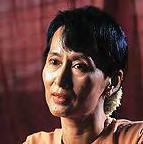
of law. Her ambition is for a democratically elected government in Hong Kong and in China. Because of her pro-democracy work and her outspokenness, she has not been allowed to travel to Mainland China for over 20 years. Lau received Honorary Doctorate from the London School of Economics and Political Science on 23 July 2019, the Bruno Kreisky Human Rights Award from the Bruno Kreisky Foundation in Vienna in 1998, the Monismanien Prize on Freedom of Speech from the University of Uppsala in Sweden in 2003, and the Political Leader Award from The Hong Kong Women’s Foundation in 2009.
“The Lady” has spent most of her life committed to the people of Burma’s struggle for justice, freedom, and democracy. Much of the last two decades has seen her locked up, but in 2010, she was released from house arrest. In 2012, she contested a by-election and won a seat in parliament. In 2015, NLD won by landslide, paving the way for her appointment as Myanmar’s State Counsellor. In 2021, a military coup d’etat deposed the civilian government. Suu Kyi, together with other civilian leaders, are now in detention.
Based on the principles of liberal democracy, the Friedrich Naumann Foundation for Freedom (FNF) offers political education in Germany and in over 60 of its offices worldwide. It is the creative innovation platform for the promotion of freedom.
Its work in Southeast & East Asia goes back to the late 1960s with its first office in Indonesia. Since then, FNF has grown in presence along with the projects that it has taken on in seven countries in the region. FNF advances individual freedom, open and digital society, and social market economy. It has

Liberal International (LI) is the world federation of over 100 liberal and progressive democratic political parties and affiliates. LI was founded in 1947 to strengthen liberal protection from totalitarianism and communism. It has since become the pre-eminent

a successful network of leaders, institutes, and organizations that shares its liberal values.
Among which is CALD.
FNF has been in partnership with CALD since CALD’s inception in 1993. They collaborate to produce publications, and organize conferences and meetings in the spirit of international dialogue designed to further policy dialogue and cooperation among likeminded Asian political parties.
Contact
29 BBC Tower, 25th Floor, Sukhumvit 63 Road, Bangkok 10110, Thailland
T +66 2 095 2740

fnf-bangkok@freiheit.org
network for promoting liberalism, individual freedom, human rights, the rule of law, tolerance, equality of opportunity, social justice, free trade and a market economy.
Contact
1 Whitehall Place, London, SW1A 2HD
T +44 20 7839 5905 office@liberal-international.org www.liberal-international.org
The National Democratic Institute for International Affairs (NDI) is a nonprofit organization working to strengthen and expand democracy worldwide. Calling on a global network of volunteer experts, NDI provides practical assistance to civic and political leaders advancing

democratic values, practices, and institutions. NDI works with democrats in every region of the world to build political and civic organizations, safeguard elections, and to promote citizen participation, openness, and accountability in government.
Contact
455 Massachusetts Ave., NW, 8th Floor Washington, DC 20001
T +1 202 728 5500
F +1 202 728 5520 www.ndi.org

The Alliance of Liberals and Democrats for Europe (ALDE) Party is the party for liberal democrat values in Europe. Together with its liberal member parties across the European continent the ALDE Party is translating the principle of freedom into politics, economics and all other areas of our societies. It provides an increasingly vital link between citizens and the EU institutions and is continuously growing in size and significance.
Formerly the European Liberal Democrat and Reform (ELDR) party, the ALDE Party consists of more than 70 member parties and thousands of individual members from countries across Europe. Liberal Democrats created their European political family in 1976 in view of the first European elections and in 1993 was established as a true transnational political party.
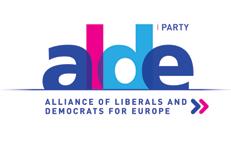
Leaders and key figures
Hans van Baalen was elected President of the European Liberal Democrats for a two-year mandate on 21 November 2015 at the Congress in Budapest, Hungary and was re-elected as President in 2017 and in 2019.
The ALDE Party brings together elected representatives, mayors, ministers, prime ministers, and members of the European Parliament from among its member parties. Together with the MEPs from the European Democratic Party and in partnership with La Republique En Marche form the Renew Europe group in the European Parliament, which is led by Dacian Cioloș MEP.
There has never been a larger centrist group in the European Parliament. By ending the dominance of the Conservatives and the Socialists, Europeans have given us a strong mandate to change Europe for the better.
We will invest in a sustainable continent. We do not have a Planet B, so we must make sure that we preserve the one we have for future generations. The Paris climate agreement of 2015 set out the roadmap, now it is time to deliver on the promises made and even go beyond them.
As of 1 February, six EU Prime Ministers belong to ALDE Party member parties:
• Andrej Babis, Prime Minister of the Czech Republic
• Xavier Bettel, Prime Minister of Luxembourg
• Alexander De Croo, Prime Minister of Belgium
• Kaja Kallas, Prime Minister of Estonia
• Micheál Martin, Prime Minister of Ireland
• Mark Rutte, Prime Minister of The Netherlands
As of 1 December, six European Commissioners represent liberal democrats:
• Margarethe Vestager, Executive Vice President, Commissioner for A Europe Fit for the Digital Age
• Věra Jourová, Vice President, Commissioner for Values and Transparency
• Didier Reynders, Commissioner for Justice
• Janez Lenarčič, Commissioner for Crisis Management
• Kadri Simson, Commissioner for Energy
• Thierry Breton, Commissioner for the Internal Market
In 60 years of European integration, the European Union has served us well in achieving peace, stability and prosperity. The EU has promoted and extended to half a billion people the four freedoms: the free movement of people, services, capital and goods across borders. We want the Union to play a key leadership role in tackling today’s and tomorrow’s global challenges. We strengthen the Liberal Democrat movement in the EU and throughout Europe; We assist Liberal Democrat politicians across Europe to become better acquainted and to define a common political vision; We draw up and adopt a common manifesto for the European Parliament elections.
At a time when the rule of law and democracy are under threat in parts of Europe, our Group will stand up for the people who suffer from the illiberal and nationalistic tendencies that we see returning in too many countries.
We thrive for a more prosperous Europe to the benefit of all Europeans. By investing in the talents of our citizens and unlocking the potential of Europe’s internal market. We strongly believe that economic growth, environmental sustainability, fair competition and responsibility go hand in hand.
Our mission is to Renew Europe. Because Europe is our future and is well worth fighting for!
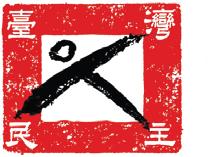
Taiwan’s peaceful transition to democracy is not only a historical accomplishment for its 23 million people, but a landmark in the worldwide spread of democracy. Only after years of struggle and effort could this transformation take place. We must never forget this history, for it shapes the cornerstone of our continued commitment to the principles of democracy and human rights.
The Taiwan Foundation for Democracy (TFD) was established with an inter-related, two-tracked mission in mind. Domestically, the TFD strives to play a positive role in consolidating Taiwan’s democracy and fortifying its commitment to human rights; internationally, the Foundation hopes to become a strong link in the global democratic network, joining forces with related organizations around the world. Through the years, Taiwan has received valuable long-term assistance and stalwart support from the international community,
Developed from what was originally called the Organisation of African Liberal Parties, the network was established during an initial meeting of political parties in Mombasa, July 2001, and was later launched formally in Johannesburg, June 2003. At the Johannesburg, June 2003 meeting, one of our cornerstone commitments, the Johannesburg Declaration was adopted, pledging like-minded political parties, organisations, networks, thinktanks and individuals to the core principles of liberal democracy.
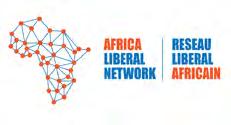
The network’s mission is to support and empower political parties, organisations, networks, think-tanks and individuals, to
and it is now time to repay that community for all of its efforts.
The Ministry of Foreign Affairs initiated the Taiwan Foundation for Democracy project in 2002. After much research and careful evaluation, the Ministry integrated the required resources from many sectors of society. In January 2003, the Ministry obtained the support of all political parties to pass the budget for the Foundation in the legislature. The TFD formally came into being on 17 June 2003, with its first meeting of the Board of Trustees and Supervisory Board. At that meeting, Legislative Yuan President Wang Jin-pyng was elected its first chairman. According to its by-laws, the TFD is governed by a total of 15 trustees and five supervisors, representing political parties, the government, academia, nongovernmental organizations, and the business sector.
Contact
No.4, Alley 17, Lane 147, Section 3, Sinyi Road, Taipei 106, Taiwan
T +886 2 2708 0100
F +886 2 2708 1148
www.tfd.org.tw
grow their support, to increase their influence on politics and to implement policies of good governance when in government.
The current active programme of the network is the Women Empowerment Programme. It is an an annual development programme for women politicians from ALN member parties. We aim to develop their knowledge and skills to win candidate nominations, upcoming elections, and internal party leadership positions. The programme also aims to dismantle barriers to women’s political participation and selection as candidates.
RELIAL (Red Liberal de América

Latina), the Liberal Network of Latin America, is a Latin Americawide network of currently 41 civil society organizations, political parties, think tanks, and researchinstitutes. RELIAL is forming the institutional frame for leaders and opinion makers, academics, intellectuals, business people, and

personalities from the region who share and profess the ideas of individual freedom, limited government, the market economy, the rule of law, and a free democratic system in the continent.
Contact
3rd Floor Travel House, 6 Hood Avenue, Rosebank, Johannesburg 2196
Republic of South Africa
T +27 11 880 8851
M +27 73 707 8513
www.africaliberalnetwork.org
Contact
IOS Offices Torre Murano, Av Insurgentes Sur 2453, Suite 6000, Piso 6
Col. Tizapan
Alvaro Obregon
CP 01090 CDMX
T +55 52 5556 5548
www.relial.org
The Council for Asian Liberals and Democrats (CALD) was inaugurated in Bangkok in 1993, with the support of then Thai Prime Minister Chuan Leekpai and South Korea’s Kim Dae-Jung. CALD, which offers a unique platform for dialogue and cooperation, is the only regional alliance of liberal and democratic political parties in Asia.
CALD was formed out of the recognition of leaders of like-minded political parties in Asia of the need for a dynamic forum promoting discussion and exchange of ideas regarding trends and challenges affecting democracy, human rights, and the rule of law in the region. The chair parties of CALD since its inception to the present have been the Democrat Party of Thailand or DP (1993 – 1995, 2002 – 2004, 2016-2018), the Democratic Progressive Party of Taiwan or DPP (1995-1997, 2004-2005, 2018-2020), the Liberal Party of the Philippines or LP (1997-1999, 2005-2007, 2020 to present), the Singapore Democratic Party or SDP (2007-2010), the Liberal Party of Sri Lanka or LPSL (19992000, 2010-2012), the Sam Rainsy Party/Cambodia National Rescue Party (2000-2002, 2012-2014), and the Civil Green Party of Mongolia (2014-2016).
The other members of CALD are the Parti Gerakan Rakyat Malaysia (PGRM), the Indonesian Democratic Party of Struggle (PDI-P), the Candle Light Party (CLP), and the Nation Awakening Party (PKB) of Indonesia, while Hong Kong legislator Emily Lau is an individual member. In 2010, CALD bestowed honorary individual membership to Daw Aung San Suu Kyi of Myanmar. The Constitutional Democratic Party (CDP) of Japan is an observer party.
Through CALD, political parties, groups, and individuals have a continuing discussion on the developments occurring in the various countries of the region. The aim is to assess the possibilities for liberal solutions to problems facing Asian democracies.
Accordingly, CALD organizes network meetings including those with its partners (Friedrich Naumann Foundation, Liberal International, Alliance for Liberals and Democrats for Europe, Renew Europe, Taiwan Foundation for Democracy, and the National Democratic Institute for International Affairs), international conferences on vital issues affecting the region, and regular workshops on communication, political management, and women in politics. It also sends missions for various advocacies, sponsors internship programs in its secretariat, as well as maintains a website, a social-network group account, and a weekly electronic newsletter.


